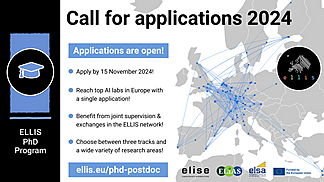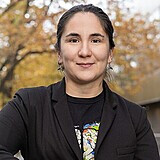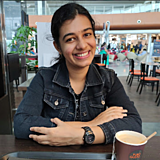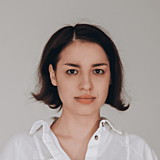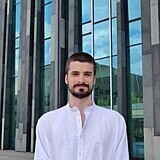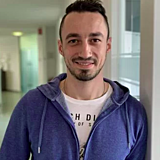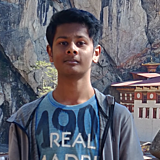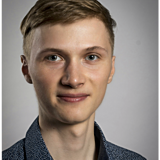PhD & Postdoc Program
The ELLIS PhD & Postdoc Program supports excellent young researchers by connecting them to leading researchers across Europe and offering a variety of networking and training activities, including summer schools and workshops. ELLIS PhDs and postdocs conduct cutting-edge curiosity-driven research in machine learning or a related research area with the goal of publishing in top-tier conferences in the field.
Interested in joining the ELLIS PhD and Postdoc Program or simply want to learn more? Click here to download a slide deck presenting the program or here to read our FAQ. If you are a prospective PhD student, these will provide you with useful information on how to apply through our Central Recruiting call (details below).
Watch this video about the program and this series of short video testimonials by some of our students to learn more about what it's like to be an ELLIS PhD student!
There are different tracks within the ELLIS PhD & Postdoc Program. These tracks have separate requirements for admission and criteria for activity during the appointment (e.g., research exchange), but otherwise offer the same benefits, network and resources to the applicant. Normally, in all tracks, the research exchange is partially sponsored by the exchange institution; students can also apply for an ELIAS mobility grant to support their visit.
Academic track
PhD students and postdocs in the academic track strive for international collaboration as they partner with two European academic institutions in their research. These candidates are supervised by two advisors from different European countries: one of the advisors must be an ELLIS fellow/scholar or unit faculty; the other advisor should be an ELLIS fellow, scholar, unit faculty or member. PhDs and postdocs in the program visit the exchange institution for min. 6 months (the partitioning of this time is flexible).
Industry track
The industry track is open to PhD and postdoc candidates that will be part of a collaboration between an academic institution and an industry partner, and will spend time conducting research at the industry partner during their PhD or postdoc. The candidate will spend a minimum of 50% of their time at the academic institution, and at least 6 months (cumulative) with the industry partner.
For this track, both advisors may be located in the same country. One advisor will represent the academic institution and the other the industry partner. One advisor must be an ELLIS fellow/scholar or unit faculty. The second advisor can be an ELLIS fellow, scholar, member, unit faculty OR it is also possible for the second advisor to join if they have co-authored a paper with the applying student as a result of their collaboration, in a top-tier venue in machine learning or related sub-fields (details here).
Interdisciplinary track
The interdisciplinary track supports PhD students and postdocs aiming to foster collaborations in two different research fields, one of which is not traditionally associated with machine learning/AI (e.g., law, biology, social sciences & humanities). The candidates will spend a minimum of 50% of their time with their main advisor (an ELLIS fellow/scholar) and at least 6 months (flexible partitioning) with the second advisor whose main expertise is unrelated to machine-learning/AI. This second advisor should further hold a tenured faculty position within their research field (if they are not an ELLIS fellow/scholar themselves).
Both advisors are based in Europe (or associated countries with ELLIS units, e.g. Israel) and may be located in the same institution/city. If that is the case, no 6-month visit is required but the PhD student/postdoc should regularly meet with their second advisor. Additionally, the candidate is then encouraged to spend at least a month abroad during their thesis/postdoc.
There are two ways to become an ELLIS PhD student or postdoc: (1) via our central application process (if you want to start a PhD with one of the ELLIS fellows/scholars or unit faculty); (2) via a nomination process (if you’re already working with one of the ELLIS fellows/scholars or unit faculty as a PhD or postdoc). Admission to the program is competitive.
1. Central application
Prospective students may apply through the central ELLIS application portal to become a PhD student within the ELLIS network (deadline once a year on November 15). In their application, applicants choose from a set of ELLIS research areas and indicate preferences for ELLIS fellows, scholars or unit faculty they would like to work with. Candidates will be centrally reviewed for excellence by a pool of experts; the best candidates will be eligible for the ELLIS program and may be invited for interviews by individual advisors. If an offer is made, an agreement is signed which specifies the main supervisor, the co-supervisor, the funding as well as the exchange and graduation plan. Students will be funded through the advisor’s resources and get their degree from the home institution. Please read our FAQs and see our slides above for more information.
Currently, the central application process is only for new PhD students. Postdocs are only recruited non-centrally via the nomination process described in 2.
Calls and admissions: There is a yearly central call for applications in fall, which will be announced on the ELLIS website. Typically the portal opens in October and the deadline for application is around November 15. Admission to the program is competitive. For reference, about 5-10% of eligible applicants are accepted via the central call. Nomination to the program (for students who already started their PhD with ELLIS faculty) is possible year-round (see 2).
Timeline for the central recruitment:
- October: Application portal opens
- November 15 (23:59 CET): application deadline
- November/December: review phase
- January/February: interviews
- Late February/March: decisions
- Program start: there is no common start for the PhD (depends on the advisor/institution)
2. Nomination
ELLIS fellows, scholars or unit faculty may nominate PhD students or postdocs who are working with them to become ELLIS PhD students or postdocs in the academic or industry track. Note that postdocs of either track are currently only recruited via nomination. Please see this page for more details about the requirements and the nomination process.
Each ELLIS PhD student or postdoc is co-supervised by one ELLIS fellow/scholar or unit faculty and one ELLIS fellow/scholar, unit faculty or member based in different European countries, and conducts an exchange of at least 6 months with the international advisor during their degree. One of the advisors may also come from industry, in which case the student will collaborate closely with the industry partner, and spend min. 6 months conducting research at the industrial lab.
If you haven't joined the ELLIS Society yet, please see ellis.eu/fellows and ellis.eu/members for more details.
Note: The term 'unit faculty' comprises ELLIS fellows, scholars and members who have been appointed by a Unit Director to be part of the respective unit. The faculty of a particular ELLIS unit is listed on the unit page >> 'Map of ELLIS Units' >> 'List of ELLIS Units' >> click the unit name to show its faculty.
Participate as ELLIS fellow, scholar, unit faculty
ELLIS fellows, scholars and unit faculty can participate in two ways:
1. Recruit new PhDs students via the yearly central recruitment round
ELLIS fellows, scholars and unit faculty who are based in Europe (and associated countries) and have open positions can sign up to recruit new PhD students via the yearly ELLIS PhD call, which collects applications from across the world on a central pan-European platform.
Applicants use our platform to find and be found for PhD opportunities in machine learning and related fields offered by fellows, scholars and unit faculty in the ELLIS network. PIs use our platform to indicate to applicants that they are looking for PhD students, and to find talented students that could be a good match for their labs. Our central portal pools hundreds of applications from across the world and provides access to comments and reviews from other PIs in the system.
In September each year, fellows, scholars and unit faculty will receive an invitation to register for that year's round (PIs need to re-register each year). They are expected to contribute to the reviewing process.
Since the ELLIS PhD Program is a metaprogram on top of local graduate program, funding for the PhD contracts must be provided by the advisor(s). The hiring process is local and must comply with local regulations and policies.
2. Nominate existing PhDs or postdocs to the program
ELLIS fellows, scholars or unit faculty may nominate PhD students or postdocs who are working with them to become ELLIS PhD students or postdocs in the academic or industry track. Note that postdocs of either track are currently only recruited via nomination. Please see this page for more details about the requirements and the nomination process.
Participate as ELLIS member
ELLIS members can nominate existing students to the program provided the other advisor is a fellow, scholar or unit faculty, and the other nomination requirements are fulfilled.
Within the program's central recruitment process, ELLIS members may be contacted by one of the participating fellows, scholars or unit faculty if they are interested in acting as a co-advisor of a selected student. The student and primary advisor decide on a co-advisor together after an offer has been made; all ELLIS members who are based in Europe qualify as co-advisors as long as the advisor, exchange and time-sharing requirements are fulfilled (for details and exceptions, see the admission requirements for the program's central recruiting).
Note: Members who have been appointed by a Unit Director to be part of a unit are considered to be part of the unit faculty and can participate as recruiting advisors in the central ELLIS PhD recruitment, provided they are entitled to supervise PhD candidates at the respective institution (see the Section 'Participate as ELLIS fellow, scholar, unit faculty'). To check the faculty of a particular ELLIS unit, check the unit page >> scroll to 'Map of ELLIS Units' >> click 'List of ELLIS Units' >> click on the unit to see its faculty.
The next chance to apply to the ELLIS PhD Program via the central recruiting is in the fall of 2024.
Admission to the program is competitive. In a typical round, less than 5% of all registered applicants, and between 5-10% of eligible applicants are accepted.
- September: call will be announced at ellis.eu/news
- October: application portal opens
- November 15 (23:59 CET): application deadline
- November/December: review phase
- January/February: interviews
- Late February/March: decisions
- Program start: there is no common start for the PhD (depends on the advisor/institution)
For PhD students who are already working as a PhD with an ELLIS Fellow or Member and wish to join the ELLIS PhD program, check out our secondary path to join the program under "How to join ELLIS as a PhD or postdoc", §2. Nomination. Nominations are possible year-round.
ELLIS offers a wide range of activities, including summer schools and workshops. You can find more details about the upcoming and past activities in the ELLIS network on the events page.
ELLIS Doctoral Symposium (EDS)
The ELLIS Doctoral Symposium is the main program event for ELLIS PhDs and postdocs (and other PhDs in the ELLIS network), organized once a year at a different unit. The EDS is organized by and for PhD students and gives young researchers the chance to meet, collaborate and interact with each other in person through content-driven poster sessions and tooling presentations, while also facilitating interactive moments for networking with each other, with senior researchers and with companies.
- EDS2024 @ ELLIS Unit Paris, 26-30 August 2024
- EDS2023 @ ELLIS Unit Helsinki, 28 August - 1 September 2023
- EDS2022 @ ELLIS Unit Alicante, 19-23 September 2022
- EDS2021 @ ELLIS Unit Tübingen, 27 September - 1 October 2021
ELLIS Machine Learning Summer Schools
ELLIS aims to host at least one machine learning summer or winter school each year. To coordinate schools across the network, the ELLIS PhD Committee issues a yearly call for units to submit a proposal for the organization of an ELLIS summer or winter school. Upcoming schools include:
- ELLIS Winter School on Foundation Models @ ELLIS Unit Amsterdam, 12-15 March 2024
- More schools for 2024 to be announced soon
Previous ELLIS Schools include:
- ELLIS Summer School on Machine Learning for Healthcare and Biology @ ELLIS Unit Manchester, 14-16 June 2023
- ELLIS Summer School on Probabilistic Machine Learning @ ELLIS Unit Cambridge, 17-21 July 2023
- ELLIS Summer School on Large-Scale AI for Research and Industry @ ELLIS Unit Modena, 18-22 September 2023
ELLIS Reading Groups
As part of its educational activities, ELLIS aims to connect PhDs and postdocs in the network and supports them in creating opportunities to discuss science. Currently, two student-led reading groups on machine learning-related topics meet regularly to discuss a paper the group previously voted on. ELLIS Reading Groups are initiated and organized by ELLIS PhD students and postdocs across Europe.
- Human-Centric Machine Learning (HCML): The HCML reading group aims to gather researchers and students interested in both getting a wide vision of the topic and also deeply diving into it. Reading papers about different topics inside HCML, and also discussing new problem set-ups, different approaches, and sources of bias will lead us to a broad understanding of how algorithmic and human decisions influence each other. (Student chairs: Adrián Arnaiz-Rodríguez, Aditya Gulati, Gergely Németh, Piera Riccio) [Webpage] [Join Google Group]
- Mathematics of Deep Learning: The Mathematics of Deep Learning group wants to discuss the theoretical directions of research on the state-of-the-art neural networks that are aiming at explaining the mechanisms behind the training, generalization, architecture and initialization choosing, etc. This reading group is not restricted by any particular application, so various tasks can be considered, ranging from the purely theoretical linear networks and binary classification to state-of-the-art transformer networks for natural language processing. The group’s main goal is to keep up with the most advanced areas of research in understanding mathematics of deep neural networks. (Student chairs: Linara Adilova, Oishi Deb, Sidak Pal Singh) [Webpage] [Join Google Group]
Several moblity programs build on the ELLIS network, including ELSA, ELIAS and ELIZA. For an overview of current and completed projects, see https://ellis.eu/mobility-programs.
For general questions about the program, questions about the central recruiting (both tracks) and questions about the academic track, please contact phd@ellis.eu. For questions about the industry track, please contact phd-industry@ellis.eu.
This project is funded by the European Union’s Horizon 2020 research and innovation programme under ELISE Grant Agreement No. 951847. The project is also supported and expanded by ELSA (European Lighthouse on Secure and Safe AI, GA No 101070617) and ELIAS (European Lighthouse of AI for Sustainability, GA No 101120237).
Latest News
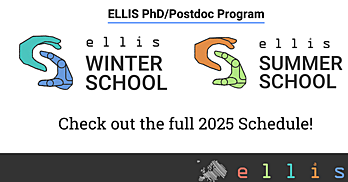
13 January 2025
Travel and study in Europe: 2025 Schedule of ELLIS PhD Winter and Summer Schools announced
The ELLIS PhD/Postdoc Program is excited to announce the 2025 schedule for Summer and Winter Schools, happening across Europe. ...
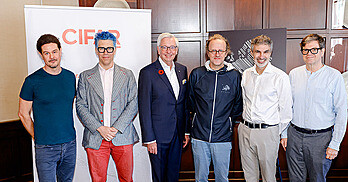
07 November 2024
ELLIS and CIFAR Join Forces to Expand ELLIS PhD & Postdoctoral Program in AI Research
At the Learning in Machines & Brains (LMB) Review & Program Meeting in Toronto, Canada, the European Laboratory for Learning a...
ELLIS PhD and Postdoc Program Committee
Committee Alumni: Valentina Boeva, Nicolò Cesa-Bianchi, Christoph Lampert, Josef Sivic, Lenka Zdeborová
ELLIS PhD and Postdoc Program Coordination
ELLIS PhD Students and Postdocs
Adaptation and Robustness in Brains and Machines
Steffen Schneider (Ph.D. Student)
Understanding the mechanisms underlying robust learning and efficient adaptation is an open problem both in neuroscience and machine learning. While robustness and domain adaptation in ML is commonly studied with computer vision tasks, adaptation research in neuroscience has been traditionally carried out in sensori...
| Primary Host: | Matthias Bethge (University of Tübingen) |
| Exchange Host: | Mackenzie Mathis (EPFL & Harvard University) |
| PhD Duration: | 01 November 2019 - 31 October 2022 |
| Exchange Duration: | 18 February 2020 - 31 March 2020 01 January 2021 - 31 January 2022 |

Multitask Visual Representation Learning
Duy-Kien Nguyen (Ph.D. Student)
In order to build a comprehensive vision system at the human level, it is necessary for the system to be able to deal with multiple problems at different levels. Previously, researchers have focused on individual tasks separately with a specific network architecture design and many hand-crafted modules, which makes ...
| Primary Advisor: | Cees Snoek (University of Amsterdam) |
| Industry Advisor: | Olaf Booij (TOMTOM) |
| PhD Duration: | 19 October 2020 - 19 October 2024 |
3D Computer Vision
Anpei Chen (PostDoc)
We plan to design cutting-edge algorithms to enable fast and generalizable 3D reconstruction, novel view synthesis, and 3D-aware image synthesis by combining advances in computer vision and computer graphics. This project includes three main parts: (1) Geometric modeling and reconstruction are fundamental to compute...
| Primary Host: | Andreas Geiger (University of Tübingen & Max Planck Institute for Intelligent Systems) |
| Exchange Host: | Siyu Tang (ETH Zürich) |
| PostDoc Duration: | 15 August 2022 - 31 May 2025 |
| Exchange Duration: | 01 June 2023 - 31 May 2025 |
3D Human Pose Estimation
Nadine Rüegg (Ph.D. Student)
I'm working at the intersection between Computer Vision and Machine Learning. Specifically, I focus on 3D human shape and pose estimation and have strong interests in unsupervised learning. I aim to find a good balance between labeling effort and performance.
| Primary Host: | Konrad Schindler (ETH Zürich) |
| Exchange Host: | Michael J. Black (Max Planck Institute for Intelligent Systems) |
| PhD Duration: | 01 June 2017 - 01 June 2022 |
| Exchange Duration: | 01 June 2018 - 01 June 2019 |
3D Perception, Reconstruction, and Understanding of Large-Scale Scenes
Haofei Xu (Ph.D. Student)
This project aims to explore how to enable 3D perception and understanding of large-scale scenes in the following aspects: 1) 3D representation. How to efficiently and effectively represent 3D remains to be an open problem, especially for large-scale scenes. 2) 3D reconstruction and synthesis. Achieving 3D reconstru...
| Primary Host: | Marc Pollefeys (ETH Zürich & Microsoft) |
| Exchange Host: | Andreas Geiger (University of Tübingen & Max Planck Institute for Intelligent Systems) |
| PhD Duration: | 01 January 2023 - 01 January 2027 |
| Exchange Duration: | 01 January 2025 - 30 June 2025 |
3D Vision Meets Deep Learning
Songyou Peng (Ph.D. Student)
My research interests lie at the intersection of deep learning and computer vision, especially 3D vision. What could be the optimal 3D representation? How to effectively and efficiently combine deep learning with 3D vision tasks? How to tackle multiple 3D tasks together with less or no supervision? During the period...
| Primary Host: | Marc Pollefeys (ETH Zürich & Microsoft) |
| Exchange Host: | Andreas Geiger (University of Tübingen & Max Planck Institute for Intelligent Systems) |
| PhD Duration: | 01 September 2019 - Ongoing |
| Exchange Duration: | 01 June 2020 - 01 June 2021 |

A causal approach to privacy, fairness and distributional robustness in machine learning
Yaxi Hu (Ph.D. Student)
While machine learning becomes an integral component of our daily life, people often overlook the profound consequences these models pose, especially concerning the privacy of the training data and fairness towards its users. Central to solving these problems is the challenge of ensuring generalization under distrib...
| Primary Host: | Bernhard Schölkopf (ELLIS Institute Tübingen & Max Planck Institute for Intelligent Systems) |
| Exchange Host: | () |
| PhD Duration: | 10 July 2023 - 09 July 2026 |
| Exchange Duration: | 20 June 2025 - 20 December 2025 |
A game theoretic framework for reinforcement learning and imitation learning
Luca Viano (Ph.D. Student)
Reinforcement Learning and Imitation Learning achieved impressive empirical results in recent years. Still, little is known about the theoretical properties of commonly used algorithms. This PhD project aims to use insights from the field of game theory and optimization to develop algorithms with mathematical guaran...
| Primary Host: | Volkan Cevher (EPFL) |
| Exchange Host: | Gergely Neu (Universitat Pompeu Fabra) |
| PhD Duration: | 01 September 2021 - 01 September 2025 |
| Exchange Duration: | 01 March 2023 - 01 September 2023 |
A geometric look to understand generalization and robustness of deep learning
Guillermo Ortiz Jiménez (Ph.D. Student)
Years of a fierce competition towards the best results have naturally selected the fittest deep learning algorithms. However, although these models work well in practice, we still lack a proper characterization of why they do so. This poses serious questions about the robustness, trust, and fairness of modern AI sys...
| Primary Host: | Pascal Frossard (EPFL) |
| Exchange Host: | Philip H. S. Torr (University of Oxford) |
| PhD Duration: | 01 November 2018 - 01 May 2023 |
| Exchange Duration: | 01 January 2022 - 30 June 2022 |
Accountability for AI
Florian Dorner (Ph.D. Student)
With the more and more widespread deployment of Al systems in the real world, they are likely going to have larger and larger impacts on society, including accidents, political destabilization and other negative externalities. To increase developers' accountability for negative societal impacts of their Al systems, ...
| Primary Host: | Moritz Hardt (Max Planck Institute for Intelligent Systems) |
| Exchange Host: | () |
| PhD Duration: | 10 October 2022 - 10 October 2025 |
| Exchange Duration: | 01 April 2024 - 01 April 2025 |
Achieving Fair, Accountable and Transparent Machine Learning Models through Graph Theory and Causality
Adrián Arnaiz-Rodríguez (Ph.D. Student)
Machine learning models are becoming the main tools for addressing complex societal problems and are also increasingly deployed to make or support decisions about individuals in many consequential areas of their lives, from justice to healthcare. Therefore, the ethical implications of such decisions, including conce...
| Primary Host: | Nuria Oliver (ELLIS Alicante Unit Foundation | Institute of Humanity-centric AI) |
| Exchange Host: | Manuel Gomez Rodriguez (Max Planck Institute for Software Systems) |
| PhD Duration: | 01 November 2021 - 01 November 2024 |
| Exchange Duration: | - Ongoing |
Advancements in 3D Scene Understanding: From Few-shot Segmentation to Multi-modal Perception
Zhaochong An (Ph.D. Student)
Accurate 3D scene understanding allows machines to recognize objects, perceive spatial relationships, infer scene semantics, and predict object behavior. This understanding is essential for many applications such as autonomous navigation, augmented and virtual reality, and robotics. One of the main challenges in dev...
| Primary Host: | Serge Belongie (University of Copenhagen & Cornell University) |
| Exchange Host: | Philip H. S. Torr (University of Oxford) |
| PhD Duration: | 01 October 2023 - 30 September 2026 |
| Exchange Duration: | 01 March 2024 - 01 September 2024 |
Advancements in Causal Abstraction: Definitions and Learning Methods
Riccardo Massidda (Ph.D. Student)
In several applications, describing a system at different levels of detail and granularity enables faster reasoning on the model and eases its interpretability. In the context of graphical causal models, Causal Abstraction is a recently defined framework that enables concise representations of low-level systems wi...
| Primary Host: | Davide Bacciu (University of Pisa) |
| Exchange Host: | Sara Magliacane (University of Amsterdam & MIT-IBM Watson AI Lab) |
| PhD Duration: | 01 October 2021 - 31 January 2025 |
| Exchange Duration: | 01 September 2023 - 29 February 2024 |

Advancing generative models for 3D synthesis
Olga Grebenkova (Ph.D. Student)
The goal of this PhD project is to investigate the potential of generative models in 3D for creating high-quality, realistic objects suitable for various applications. While significant progress has been made in text-to-image synthesis using diffusion models trained on billions of image-text pairs, applying this tec...
| Primary Advisor: | Björn Ommer (LMU Munich & University of Heidelberg) |
| Industry Advisor: | Peter Kontschieder (Meta) |
| PhD Duration: | 01 September 2023 - 31 August 2026 |

Advancing Human Behavior Understanding and Simulation
Xuejing Luo (Ph.D. Student)
This PhD project aims to advance the understanding and simulation of human behaviour by developing innovative methods that integrate visual perception with physical dynamics. The research is divided into two primary areas: understanding human motion and human-scene interaction.
| Primary Host: | Antti Oulasvirta (Aalto University & Finnish Centre for AI) |
| Exchange Host: | Mingfei Sun (University of Manchester) |
| PhD Duration: | 02 August 2024 - 01 August 2028 |
| Exchange Duration: | - Ongoing |
Advancing SLAM through Deep Learning
Niclas Vödisch (Ph.D. Student)
A fundamental challenge in the field of mobile robotics is to determine the robot’s pose relative to its environment. Commonly, this is achieved by employing simultaneous localization and mapping (SLAM) systems. While classical methods are well studied and provide reliable solutions to the localization problem, how ...
| Primary Host: | Wolfram Burgard (Technical University of Nuremberg) |
| Exchange Host: | Davide Scaramuzza (ETH & University of Zürich) |
| PhD Duration: | 01 June 2021 - 31 May 2025 |
| Exchange Duration: | 01 June 2023 - 30 November 2023 |

AI and Machine learning for Trustworthy Autonomous Intelligent Machines and Systems
Oishi Deb (Ph.D. Student)
This project focuses on theoretical as well as applied research on trustworthy autonomous intelligent machines and systems to ensure better decision-making in safety-critical applications. It will address vulnerabilities and countermeasures of ML and AI algorithms that are being used in Autonomous Systems (AS). Unce...
| Primary Advisor: | Michael A. Osborne (University of Oxford) |
| Industry Advisor: | Philip H. S. Torr (University of Oxford) |
| PhD Duration: | 01 October 2023 - 31 July 2027 |
AI Fairness in Federated Learning
Gergely Dániel Németh (Ph.D. Student)
Federated Learning is a rapidly emerging approach to solve privacy problems regarding Machine Learning applications. Fairness in Artificial Intelligence is also a field that gained awareness in recent years. At the intersection of the two fields, we can find new solutions for problems that exist in centralized machi...
| Primary Host: | Nuria Oliver (ELLIS Alicante Unit Foundation | Institute of Humanity-centric AI) |
| Exchange Host: | Novi Quadrianto (University of Sussex) |
| PhD Duration: | 01 November 2021 - 31 July 2024 |
| Exchange Duration: | 01 January 2023 - 30 June 2023 |
Analysing the effect of counter-narratives on hateful conversations online
Nicolò Penzo (Ph.D. Student)
While the task of automatically recognising hateful content online has been extensively explored in the last years within the NLP community, what is the best strategy to respond to such messages has only recently entered the research agenda. Specifically, some works in the last few years have tackled the issue of au...
| Primary Host: | Bruno Lepri (FBK & MIT Media Lab) |
| Exchange Host: | Goran Glavaš (University of Würzburg) |
| PhD Duration: | 01 November 2022 - 31 October 2025 |
| Exchange Duration: | 01 January 2024 - 30 June 2024 |
Analyzing and Improving the Out-Of-Distribution Generalization Capability of Visual Foundation Models
Mohamed Afham (Ph.D. Student)
Technological advancements, fueling the abundance of online visual content, have enabled extensive pre-training of computer vision foundation models. In computer vision literature foundation models are referred to as the base models trained on large-scale data in a self-supervised or semi-supervised manner that can ...
| Primary Advisor: | Stefan Roth (Technical University of Darmstadt) |
| Industry Advisor: | Laura Leal-Taixé (Technical University of Munich & NVIDIA) |
| PhD Duration: | 01 October 2023 - 01 August 2028 |
Anytime Uncertainty in (Bayesian) Deep Learning
Metod Jazbec (Ph.D. Student)
The predictions generated by neural networks are fairly useless without a corresponding notion of confidence or uncertainty. Accordingly, methods for cheaply quantifying the uncertainty of NNs have received much attention. Yet, one issue that is often ignored is that our models operate under dynamic computation cons...
| Primary Advisor: | Eric Nalisnick (University of Amsterdam) |
| Industry Advisor: | Dan Zhang (Bosch Center for AI) |
| PhD Duration: | 01 October 2022 - 30 September 2026 |
Application of Neural Networks in Many-Body Physics
Sebastian Sanokowski (Ph.D. Student)
Problems with a large number of interacting particles are ubiquitous in science and key to many future technologies. Recently, the successful application of deep learning methods to such problems led to remarkable progress in statistical mechanics, quantum chemistry and condensed matter physics. We will investigate ...
| Primary Host: | Sepp Hochreiter (Johannes Kepler University Linz) |
| Exchange Host: | Giuseppe Carleo (EPFL) |
| PhD Duration: | 02 May 2021 - 31 October 2024 |
| Exchange Duration: | 01 February 2024 - 01 August 2024 |
Artificial Scientific Discovery
Antonio Norelli (Ph.D. Student)
Explanations are the fuel of progress, the fundamental tool through which humans have increased their agency, earning more and more control over their future throughout history. So far, the production of these extraordinary symbolic sequences has been a unique prerogative of human scientists, but the formidable brea...
| Primary Host: | Emanuele Rodolà (Sapienza University of Rome) |
| Exchange Host: | Francesco Locatello (IST Austria) |
| PhD Duration: | 01 November 2019 - 26 January 2024 |
| Exchange Duration: | 15 January 2022 - 15 July 2022 |
Attention-guided cross domain visual geo-localization
Gabriele Trivigno (Ph.D. Student)
Photo geolocation is a challenging task since many photos offer only few cues about their location. For instance, an image of a beach could be taken on many coasts across the world. Even when landmarks are present there can still be ambiguity: a photo of the Rialto Bridge could be taken either at its original locat...
| Primary Host: | Barbara Caputo (Politecnico di Torino & Italian Institute of Technology) |
| Exchange Host: | Torsten Sattler (Czech Technical University) |
| PhD Duration: | 01 November 2021 - 01 November 2024 |
| Exchange Duration: | 01 February 2024 - Ongoing 01 August 2024 - Ongoing |
Automated Painting: Object Modeling, Trajectory Learning and Adaptation
Gabriele Tiboni (Ph.D. Student)
Spray painting is a task commonly performed by robots in industry. Automating this process offers advantages on the consistency of the results and repeatability over even the most skilled human operator, with the further benefit of limiting human exposure to hazardous environments. The goal of this thesis is to redu...
| Primary Host: | Tatiana Tommasi (Politecnico di Torino) |
| Exchange Host: | Jan Peters (Technical University of Darmstadt & DFKI) |
| PhD Duration: | 01 November 2021 - 31 October 2024 |
| Exchange Duration: | 01 January 2023 - 01 July 2023 |
Automated Synthesis of Counterfactual Interventions for Explainable and Fair Machine Learning
Giovanni De Toni (Ph.D. Student)
As humans, we make countless decisions every day in many different areas of our lives. Recently, state-of-the-art machine learning models have been used to build automated decision-making systems to enhance human judgment, ranging from accepting or rejecting a job applicant to prescribing medications and treatments....
| Primary Host: | Bruno Lepri (FBK & MIT Media Lab) |
| Exchange Host: | Manuel Gomez Rodriguez (Max Planck Institute for Software Systems) |
| PhD Duration: | 01 October 2021 - 31 October 2025 |
| Exchange Duration: | 01 January 2023 - 01 June 2023 |

Bayesian deep learning for medical time series
Fedor Sergeev (Ph.D. Student)
Deep learning (DL) has seen tremendous growth in the last 20 years and enabled rapid advances in computer vision, natural language processing, and robotics. However, the direct application of DL methods to healthcare is challenging due to the nature of medical data. Creating specialized data sets for DL in medical a...
| Primary Host: | Gunnar Rätsch (ETH Zürich) |
| Exchange Host: | Vincent Fortuin (Helmholtz AI) |
| PhD Duration: | 01 July 2023 - 01 December 2027 |
| Exchange Duration: | - Ongoing |

Bayesian networks for interpretable machine learning
Enrique Valero (Ph.D. Student)
The project orbit arounds the state-of-the-art topic of explainable artificial intelligence, that aims toward making intelligent system easier to understand. Most of the current literature covers topics related to neural networks and deep learning applied to supervised learning tasks. However, simpler models with go...
| Primary Host: | Pedro Larrañaga (Universidad Politécnica de Madrid) |
| Exchange Host: | Bernd Bischl (LMU Munich) |
| PhD Duration: | 01 October 2022 - 01 August 2025 |
| Exchange Duration: | 01 September 2024 - 01 April 2025 |
Bridging Theory and Algorithms for Lifelong Learning
Marco Ciccone (PostDoc)
One of the most ambitious goals of Artificial Intelligence is to provide an agent with the ability to continually learn in an open-ended scenario. Lifelong Learning, or Continual Learning (CL), explicitly focuses on non-stationary or changing environments, where an agent has to complete a series of partially related...
| Primary Host: | Barbara Caputo (Politecnico di Torino & Italian Institute of Technology) |
| Exchange Host: | Carlo Ciliberto (University College London) |
| PostDoc Duration: | 01 June 2021 - 31 May 2023 |
| Exchange Duration: | 01 February 2022 - 01 August 2022 |
Building the mathematical structure of symmetries and causality into neural networks
Pim de Haan (Ph.D. Student)
A growing consensus in the field is that many machine learning problems possess symmetries and that neural networks that respect those symmetries – are equivariant – outperform models that are not. The goal of the PhD project is to generalize the used mathematical toolkit of groups and representations to more genera...
| Primary Advisor: | Max Welling (University of Amsterdam) |
| Industry Advisor: | Taco Cohen (Qualcomm AI Research) |
| PhD Duration: | 01 April 2019 - 01 April 2023 |
Causal Effect Estimation with Hidden Confounding and Aggregated Data
Yuchen Zhu (Ph.D. Student)
Causal effect estimation is ubiquitous in many social science and public health domains. In such domains treatment variables and outcome variables are often confounded, and sometimes the confounding is hidden, requiring methods capable of correcting for these. Moreover, in many social science domains the variables...
| Primary Advisor: | Matt J. Kusner (University College London) |
| Industry Advisor: | Dominik Janzing (Amazon Research Tübingen) |
| PhD Duration: | 01 October 2020 - 01 August 2025 |
Causal Inference in Reinforcement Learning
Stephan Bongers (PostDoc)
Recent advances in reinforcement learning have led to automated decision-making systems that perform remarkably well on various tasks. Despite these remarkable achievements, applying reinforcement learning in practice often remains challenging. One major challenge is that one often needs knowledge of the environment...
| Primary Advisor: | Frans A. Oliehoek (Delft University of Technology) |
| Industry Advisor: | Onno Zoeter (Booking.com) |
| PostDoc Duration: | 01 November 2022 - 01 November 2024 |
Causal inference under Gaussian Process
Zonghao Chen (Ph.D. Student)
The project aims to incorporate the reliable uncertainty estimate from Gaussian Processes (GP) into causality inference. Recent work on causality inference based on kernel methods have demonstrated both theoretical guarantees and good empirical performances. Therefore, the aim of this project to extend from kernel m...
| Primary Host: | Arthur Gretton (University College London) |
| Exchange Host: | Philipp Hennig (University of Tübingen) |
| PhD Duration: | 26 September 2022 - 01 August 2026 |
| Exchange Duration: | 01 March 2023 - 01 September 2023 |
Causal inference with fewer assumptions
Kirtan Padh (Ph.D. Student)
Causality has recently been seen as a promising path towards designing more reliable machine learning algorithms, in the sense of robustness, domain generalization, fairness, interpretability and more. However, there have also been some criticisms regarding the strong and unrealistic assumptions that causal inferenc...
| Primary Host: | Niki Kilbertus (Technical University of Munich & Helmholtz Center Munich) |
| Exchange Host: | Ricardo Silva (University College London) |
| PhD Duration: | 01 March 2021 - 28 February 2025 |
| Exchange Duration: | - Ongoing |
Causal modelling and applications to domain adaptation
Philiip Boeken (Ph.D. Student)
In this project, we investigate multiple aspects of causal modelling. We have investigated how causal models can be used to correct for selection bias and missing response when learning a regression model. In a follow-up project, we have investigated how the practical use of predictions can affect the value of the v...
| Primary Advisor: | Joris M. Mooij (University of Amsterdam) |
| Industry Advisor: | Onno Zoeter (Booking.com) |
| PhD Duration: | 15 November 2021 - 15 November 2025 |
Causal relationships in nonlinear representation learning
Patrik Reizinger (Ph.D. Student)
The robustness of underlying representations is a key for deploying machine learning systems in real-world applications. This requires both the possibly unique identification of the latent factors themselves and their connections as well. Although the topic is an active research area, there are no satisfactory algor...
| Primary Host: | Matthias Bethge (University of Tübingen) |
| Exchange Host: | Ferenc Huszár (University of Cambridge) |
| PhD Duration: | 01 April 2021 - 31 March 2024 |
| Exchange Duration: | 01 September 2022 - 28 February 2023 |
Causal Representations for Reinforcement Learning
Yashas Annadani (Ph.D. Student)
Systematic generalisation beyond the independent and identically distributed (IID) setting is crucial for learning agents interacting with the environment in the real-world. Improvements with regards to generalisation has been seen in supervised learning with large language and vision models and out-of-distribution ...
| Primary Host: | Stefan Bauer (Helmholtz Center Munich & Technical University of Munich) |
| Exchange Host: | Bernhard Schölkopf (ELLIS Institute Tübingen & Max Planck Institute for Intelligent Systems) |
| PhD Duration: | 01 October 2021 - 30 September 2025 |
| Exchange Duration: | 01 October 2021 - 31 March 2022 |
Causality in heavy missing data scenarios
Sergio Hernan Garrido Mejia (Ph.D. Student)
Whenever we see the world we rarely observe all the variables of any system of interest at the same time. However, we can create hypotheses of causal relations by combining information of these partially observed scenarios. In this research, we will focus on the question of extracting causal information from scenari...
| Primary Advisor: | Bernhard Schölkopf (ELLIS Institute Tübingen & Max Planck Institute for Intelligent Systems) |
| Industry Advisor: | Dominik Janzing (Amazon Research Tübingen) |
| PhD Duration: | 01 December 2021 - 01 December 2024 |
Causality of Enhanced Model Interpretability
Amir-Hossein Karimi (Ph.D. Student)
As machine learning is increasingly used to inform decision-making in consequential real-world settings (e.g., pre-trial bail, loan approval, or prescribing life-altering medication), it becomes important to explain how the system arrived at its decision, and also suggest actions to achieve a favorable decision. My ...
| Primary Host: | Bernhard Schölkopf (ELLIS Institute Tübingen & Max Planck Institute for Intelligent Systems) |
| Exchange Host: | Thomas Hofmann (ETH Zürich) |
| PhD Duration: | 01 October 2018 - 31 December 2022 |
| Exchange Duration: | 01 September 2020 - 31 August 2021 |
Cognitive models for Meta-Reinforcement-Learning
Julian Coda-Forno (Ph.D. Student)
The project aims to use cognitive science models and inspiration to develop better Meta-RL agents. Meta-RL is the combination of two disciplines in Machine Learning, Meta-learning and Reinforcement Learning. Meta-learning is the idea inspired by psychology of “learning to learn” in humans, and looks at how an AI can...
| Primary Advisor: | Eric Schulz (Max Planck Institute for Biological Cybernetics) |
| Industry Advisor: | Jane X. Wang (DeepMind) |
| PhD Duration: | 22 August 2022 - 22 August 2026 |
Combining Probabilistic Inference and Deep Learning
James Urquhart Allingham (Ph.D. Student)
Deep learning is an extremely successful machine learning paradigm that has been the driving force behind the renewed excitement around machine learning over the last seven or so years since AlexNet won the ImageNet LSVRC competition. However, despite the successes of deep learning, it is not without its flaws. One ...
| Primary Host: | José Miguel Hernández-Lobato (University of Cambridge) |
| Exchange Host: | Eric Nalisnick (University of Amsterdam) |
| PhD Duration: | 01 October 2019 - 30 April 2023 |
| Exchange Duration: | 01 February 2022 - 31 July 2022 |

Comparison of heterogeneous or uncertain network structures
Diane Duroux (Ph.D. Student)
Seeking reproducibility of findings is an essential part of research. This becomes a tedious and cumbersome task when big data with dependant features or multiple potentially interdependent data sources become available. Earlier work has shown that this is already the case for GWAIS compared to easier GWAS. The main...
| Primary Host: | Kristel Van Steen (University of Liège & KU Leuven) |
| Exchange Host: | Karsten Borgwardt (Max Planck Institute of Biochemistry) |
| PhD Duration: | 15 March 2019 - 15 March 2022 |
| Exchange Duration: | 01 February 2021 - 30 April 2021 |
Computational Rationality in AI-Assisted Decision Making
Yifan Zhu (Ph.D. Student)
Effective and smooth human-AI collaboration in decision-making requires the AI assistant to accurately comprehend human intentions by observing behaviour. While much of the research in this field emphasizes advanced AI techniques for inverse modelling and obtains promising results, it often oversimplifies human beha...
| Primary Host: | Samuel Kaski (Aalto University, Finnish Centre for AI & University of Manchester) |
| Exchange Host: | Mingfei Sun (University of Manchester) |
| PhD Duration: | 01 September 2023 - 31 August 2027 |
| Exchange Duration: | 01 September 2025 - 28 February 2026 |
Continual Learning
Mohammad Derakhshani (Ph.D. Student)
Despite the promise of artificially intelligent agents, they are known to suffer from catastrophic forgetting when learning over nonstationary data distributions. Continual learning, also known as life-long learning, was introduced to deal with catastrophic forgetting. In this framework, an agent continually learns ...
| Primary Advisor: | Cees Snoek (University of Amsterdam) |
| Industry Advisor: | Xiantong Zhen (University of Amsterdam & Inception Institute of Artificial Intelligence) |
| PhD Duration: | 01 January 2020 - 31 December 2023 |
Continual Learning in Computer Vision
Sebastian Dziadzio (Ph.D. Student)
The dominant deep learning setting involves training a model offline on a fixed dataset before deploying it in the real world. Implicit in this approach is an important and restrictive assumption: both the training data and future inputs are assumed to be IID samples from a single stationary distribution. In reality...
| Primary Host: | Matthias Bethge (University of Tübingen) |
| Exchange Host: | Tinne Tuytelaars (KU Leuven) |
| PhD Duration: | 01 February 2022 - 31 January 2025 |
| Exchange Duration: | 01 April 2023 - 01 October 2023 |
Continual Multimodal Leaming
Nico Daheim (Ph.D. Student)
Many NLP tasks require incorporating not only textual data but also other modalities, such as images, speech, or software code. In this project, we aim to build systems that can jointly reason over these different modalities with diverse applications, for example in dialog systems. Furthermore, the information that ...
| Primary Host: | Iryna Gurevych (Technical University of Darmstadt) |
| Exchange Host: | () |
| PhD Duration: | 01 September 2022 - 31 August 2026 |
| Exchange Duration: | 01 September 2024 - 31 August 2025 |
Continual Open-set Object Detection
Yaoyao Liu (Ph.D. Student)
Most object detection methods require abundant labeled training samples per category. However, we often receive a continuous temporal stream of visual data with many unknown categories in real-world applications. For example, a robotic learning system needs to deal with new objects observed in the environments but c...
| Primary Host: | Bernt Schiele (Max Planck Institute for Informatics & Saarland University) |
| Exchange Host: | Christian Rupprecht (University of Oxford) |
| PhD Duration: | 01 February 2020 - 01 July 2023 |
| Exchange Duration: | 15 July 2022 - 15 January 2023 |
Continual Reinforcement Learning with associative memories
Thomas Schmied (Ph.D. Student)
The current generation of Deep Reinforcement learning systems is primarily designed to solve one particular task in a single stationary environment. However, the real world is non-stationary and dynamic by nature. For Reinforcement learning agents to be useful under these circumstances, they need to have the ability...
| Primary Advisor: | Sepp Hochreiter (Johannes Kepler University Linz) |
| Industry Advisor: | Razvan Pascanu (Google DeepMind) |
| PhD Duration: | 01 February 2022 - 31 January 2025 |
Continually Learning to Detect Distribution Shifts
Mona Schirmer (Ph.D. Student)
Autonomous vehicles are continuously collecting data, and the system must decide which observations are sufficiently interesting enough to save for future use. In settings like this, one cannot use a static model to determine what constitutes an anomaly. For instance, when the car first encounters snow, this is like...
| Primary Advisor: | Eric Nalisnick (University of Amsterdam) |
| Industry Advisor: | Dan Zhang (Bosch Center for AI) |
| PhD Duration: | 15 July 2022 - 14 July 2026 |
Controllable and faithful generation of language in time critical low-resource scenarios
Mayank Jobanputra (Ph.D. Student)
Today's neural generation systems produce fluent text, but are prone to generate factual errors. This is particularly problematic for safety-critical settings such as generation systems that assist human experts in making quick decisions for autonomous systems. The thesis project will focus on generating relevant,...
| Primary Host: | Vera Demberg (Saarland University) |
| Exchange Host: | Raquel Fernández (University of Amsterdam) |
| PhD Duration: | 01 September 2023 - 31 December 2026 |
| Exchange Duration: | - Ongoing |
Cost-efficient learning via weak annotators
Hao Qiu (Ph.D. Student)
In this project, we plan to design and analyze new algorithms for sequentially classifying a stream of data points based on a set of costly, noisy, and potentially malicious annotators. Assuming the algorithm obtains noisy labels by adaptively querying selected annotators, we are interested in studying trade-offs be...
| Primary Host: | Nicolò Cesa-Bianchi (Università degli Studi di Milano) |
| Exchange Host: | Wouter M. Koolen (Centrum Wiskunde & Informatica) |
| PhD Duration: | 01 October 2022 - 30 September 2025 |
| Exchange Duration: | 01 September 2023 - 30 November 2023 01 September 2024 - 30 November 2024 |
Cross Modal Neural Architecture Search
Niccolò Cavagnero (Ph.D. Student)
Determining an optimal architecture is key to accurate deep neural networks (DNNs) with good generalisation properties. Neural architecture search (NAS) can potentially reduce the need for application-specific expert designers allowing for a wide-adoption of sophisticated networks in various industries. It has been ...
| Primary Host: | Barbara Caputo (Politecnico di Torino & Italian Institute of Technology) |
| Exchange Host: | Bastian Leibe (RWTH Aachen University) |
| PhD Duration: | 01 October 2021 - 01 October 2024 |
| Exchange Duration: | 01 February 2024 - 01 August 2024 |

Cross-Domain 3D Visual Learning
Antonio Alliegro (Ph.D. Student)
Depth cameras and LiDAR sensors are important tools for agents that need to perceive the world and interact with it, thus 3D data managing and learning algorithms are quickly becoming essential. Deep learning has achieved a significant leap for 2D computer vision, and for 3D applications is currently demonstrating g...
| Primary Host: | Tatiana Tommasi (Politecnico di Torino) |
| Exchange Host: | Matthias Nießner (Technical University of Munich) |
| PhD Duration: | 01 November 2020 - 31 October 2023 |
| Exchange Duration: | 01 July 2022 - 31 December 2022 |

Cross-domain activity classification from multiple information channels
Chiara Plizzari (Ph.D. Student)
Recognizing human actions from videos is one of the most critical challenges in computer vision since its infancy. An open challenge is that video analysis systems heavily rely on the environment in which the activities are recorded, which inhibits their ability to recognize actions when they are recorded in unfamil...
| Primary Host: | Barbara Caputo (Politecnico di Torino & Italian Institute of Technology) |
| Exchange Host: | Dima Damen (University of Bristol) |
| PhD Duration: | 01 September 2020 - 31 March 2024 |
| Exchange Duration: | 29 August 2022 - 27 November 2022 |
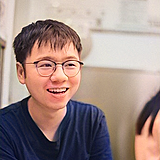
Cross-Lingual Document Summarization
Yifu Qiu (Ph.D. Student)
Automatic document summarization is an area in Natural Language Processing focused on taking input documents and outputting a concise summary of them. Such summaries allow potential readers to sift through a more significant amount of information in a shorter time and focus on the most critical content. Recent work ...
| Primary Host: | Shay Cohen (University of Edinburgh) |
| Exchange Host: | Anna Korhonen (University of Cambridge) |
| PhD Duration: | 01 September 2023 - 01 September 2026 |
| Exchange Duration: | - Ongoing |
Curation of Medical Image Data using lnteractive Learning
Stefan Denner (Ph.D. Student)
Artificial intelligence (Al)'s potential applications in medical imaging are vast and significant. One of the chief obstacles to the development and clinical implementation of Al algorithms is the availability of sufficiently large, curated, and representative training data based on expert labeling. Collecting such ...
| Primary Host: | Klaus Maier-Hein (German Cancer Research Center & University of Heidelberg) |
| Exchange Host: | Mihaela van der Schaar (University of Cambridge, The Alan Turing Institute & University of California) |
| PhD Duration: | 20 April 2022 - 19 April 2025 |
| Exchange Duration: | 01 February 2023 - 28 February 2023 01 June 2023 - 30 June 2023 |
Data and Compute Efficient Adaptation of Large Pretrained Models
Konstantin Dobler (Ph.D. Student)
Publicly released checkpoints of large pretrained models are quickly becoming ubiquitous. These checkpoints are an important resource in practice due to the large amount of compute invested in them. However, for most real-world use cases, these checkpoints will have to be adapted to obtain the best performance. In m...
| Primary Host: | Gerard de Melo (Hasso Plattner Institute & University of Potsdam) |
| Exchange Host: | Desmond Elliott (University of Copenhagen) |
| PhD Duration: | 01 November 2022 - 31 October 2026 |
| Exchange Duration: | 01 April 2025 - 31 October 2025 |
Dealing with Domain Shift under Resource Constraints
Niclas Popp (Ph.D. Student)
This PhD project aims at addressing two major challenges that deep learning models for perception face when being deployed on edge devices (such as in driver assistance/automated driving, mobile robotics, video surveillance): (i) resources are limited in edge devices and there are hard limits on, e.g., latency and e...
| Primary Advisor: | Matthias Hein (University of Tübingen) |
| Industry Advisor: | Jan Hendrik Metzen (Bosch Center for AI) |
| PhD Duration: | 01 October 2023 - 01 September 2026 |

Debiasing Multilingual Representations by Discovering Shared Bias Components in Multiple Languages
Shun Shao (Ph.D. Student)
Modern NLP models that learn from tremendous data are extremely powerful. However, they also tend to associate certain gender, race, or religion with the label, and make unfair and biased predictions. Multilingual debiasing is a promising topic that tries to learn a debiasing model from multiple languages, and debia...
| Primary Host: | Anna Korhonen (University of Cambridge) |
| Exchange Host: | Shay Cohen (University of Edinburgh) |
| PhD Duration: | 01 October 2023 - 30 September 2027 |
| Exchange Duration: | - Ongoing |

Deep Learning-driven Enhancer Design
Animesh Awasthi (Ph.D. Student)
Understanding the complex regulation of gene expression by non-coding regions of the genome for cell-type-specific transcriptional activity is very challenging. Such regulatory mechanisms are crucial for developing a deeper understanding of human diseases and potential therapeutic strategies. Advancements in high-th...
| Primary Host: | Christoph Bock (CeMM Research Center for Molecular Medicine) |
| Exchange Host: | Erik J. Bekkers (University of Amsterdam) |
| PhD Duration: | 21 August 2023 - 20 August 2027 |
| Exchange Duration: | 01 July 2025 - 31 December 2025 |

Design and development of computational methods to facilitate the analysis of single-cell multi-omics and single-cell perturbational data
Amir Ali Moinfar (Ph.D. Student)
Single-cell omics allow us to study biological processes at single-cell resolution. The applications of single-cell omic studies range from understanding cellular processes to drug design. We need to design and develop computational models that can handle the complexity and magnitude of data generated by these studi...
| Primary Host: | Fabian Theis (Helmholtz Center Munich) |
| Exchange Host: | Gunnar Rätsch (ETH Zürich) |
| PhD Duration: | 25 April 2022 - 25 April 2025 |
| Exchange Duration: | 01 June 2024 - 01 January 2025 |

Discovering causal mechanisms in Single-Cell Omics
Alejandro Tejada (Ph.D. Student)
Single-Cell genomics allow to get a fine resolution of the internal state of a cell. Nevertheless, the dynamics and mechanisms that rule the behaviour of cells are mainly unknown. Due to the enormous number of degrees of freedom, classical scientific approaches may fail at modelling and capturing the complexity of S...
| Primary Advisor: | Fabian Theis (Helmholtz Center Munich) |
| Industry Advisor: | Taco Cohen (Qualcomm AI Research) |
| PhD Duration: | 01 July 2022 - 01 July 2025 |
Dynamically Evolving Deep Architectures
Rupert Mitchell (Ph.D. Student)
My research focuses on the modification of deep architectures live during training. In contrast to the relatively well explored area of the pure removal of parts of an architecture (i.e. pruning), I am particularly interested in combining this with the addition of parts as well, for example increasing the width or d...
| Primary Host: | Kristian Kersting (Technical University of Darmstadt) |
| Exchange Host: | Ole Winther (University of Copenhagen & Technical University of Denmark) |
| PhD Duration: | 08 September 2021 - 07 September 2024 |
| Exchange Duration: | - Ongoing |
Efficent Medical Segmentation
Jie Liu (Ph.D. Student)
Medical segmentation plays an important role in adaptive radiotherapy. However, current medical segmentation methods require tons of annotated samples to achieve robust result, thus posing great pressure on data annotation. With this project, we focus on developing effecicent medical segmentation alghrithm, thus rec...
| Primary Advisor: | Efstratios Gavves (University of Amsterdam) |
| Industry Advisor: | Jan-Jakob Sonke (Netherlands Cancer Institute) |
| PhD Duration: | 01 September 2021 - Ongoing |
Efficient Deep Learning for Sets
David Zhang (Ph.D. Student)
Sets help us organize our understanding of the real world: complex images can be simplified as sets of objects, arbitrary 3D shapes can be described by sets of coordinates, and graphs (a tuple of two sets) can model all relational structures between objects. My research focuses on inferring sets with deep learning a...
| Primary Advisor: | Cees Snoek (University of Amsterdam) |
| Industry Advisor: | Gertjan Burghouts (TNO) |
| PhD Duration: | 01 April 2019 - 31 March 2023 |
Efficient egocentric vision models for the edge
Gabriele Goletto (Ph.D. Student)
With the advent of machines capable, in principle, to cooperate with humans in performing tasks of daily living, it becomes crucial the development of methods to quickly and easily infer human actions from common data. Egocentric vision is rapidly becoming one of the most promising source of information for this pur...
| Primary Host: | Barbara Caputo (Politecnico di Torino & Italian Institute of Technology) |
| Exchange Host: | Dima Damen (University of Bristol) |
| PhD Duration: | 01 January 2022 - 31 December 2024 |
| Exchange Duration: | 01 February 2023 - 31 July 2023 |
Efficient Learning and Rendering of Neural Representation for Mobile Devices
Stefano Esposito (Ph.D. Student)
Neural Radiance Fields (NeRFs) can create images of 3D scenes from new perspectives, but real-time rendering is hard. Some methods for real-time rendering exist, but they have trade-offs and require high-end GPUs. This study aims to develop training procedures and rendering algorithms for neural implicit surfaces su...
| Primary Advisor: | Andreas Geiger (University of Tübingen & Max Planck Institute for Intelligent Systems) |
| Industry Advisor: | Peter Kontschieder (Meta) |
| PhD Duration: | 01 May 2023 - 30 April 2026 |

Efficient tuning of quantum devices using machine learning
Lucas Schorling (Ph.D. Student)
The critical challenge in the development of scalable quantum technologies, such as quantum computers, is the increasingly complex and time-consuming task of characterizing and tuning a large number of quantum devices. As the scale of these technologies expands, traditional methods of characterization become intract...
| Primary Host: | Michael A. Osborne (University of Oxford) |
| Exchange Host: | Florian Marquardt (Max Planck Institute for the Science of Light & University of Erlangen-Nuremberg) |
| PhD Duration: | 01 October 2023 - 30 September 2026 |
| Exchange Duration: | - Ongoing |

Efficient Video Representation Learning
Mohammadreza Salehi (Ph.D. Student)
In recent years, representation learning has made significant strides, enabling self-supervised learning methods to achieve comparable performance to supervised approaches. However, these models typically require extensive training datasets and substantial computational resources to achieve their optimal performance...
| Primary Advisor: | Cees Snoek (University of Amsterdam) |
| Industry Advisor: | Yuki M. Asano (University of Amsterdam) |
| PhD Duration: | 01 October 2021 - Ongoing |

Egocentric Vision for Advanced Human-Robot Cooperation
Simone Peirone (Ph.D. Student)
In recent times, research in robotics devoted a significant effort to the development of compliant manipulators capable of interacting with the surrounding environment safely and effectively. However, while many studies focused on pushing the limits of human-robot interaction with novel control, planning, and task a...
| Primary Host: | Giuseppe Averta (Politecnico di Torino) |
| Exchange Host: | Pascal Frossard (EPFL) |
| PhD Duration: | 01 November 2022 - 31 October 2025 |
| Exchange Duration: | 01 January 2025 - 30 June 2025 |

Enabling complex computer vision tasks on the edge: applications to semantic segmentation and beyond
Claudia Cuttano (Ph.D. Student)
Most of the research in Deep Learning for Computer Vision is dedicated to the development of novel, more and more complex and overparametrized architectures which increase state of the art accuracy in solving specific tasks. However, this approach lays its foundations on the strong assumption that it is always possi...
| Primary Host: | Giuseppe Averta (Politecnico di Torino) |
| Exchange Host: | Stefan Roth (Technical University of Darmstadt) |
| PhD Duration: | 01 February 2023 - 31 January 2026 |
| Exchange Duration: | 01 January 2025 - 30 June 2025 |

Enhancing Risk-Aware Navigation for Legged Robots in Dynamic Construction Site Environments Using Foundational Language Models and Building Information Maps
Maya Sitaram (Ph.D. Student)
This research aims to advance the autonomous navigation capabilities of legged robots in construction site environments by integrating foundational language models with Building Information Maps (BIM). Robots show immense potential in construction site monitoring, offering the ability to generate detailed 3D maps an...
| Primary Host: | Wolfram Burgard (Technical University of Nuremberg) |
| Exchange Host: | () |
| PhD Duration: | 01 September 2023 - 01 September 2026 |
| Exchange Duration: | - Ongoing |

Essentials for few-shot learning on images
Jelena Bratulic (Ph.D. Student)
Few-shot learning strives to imitate the ability of humans to learn how to recognize an object after only having seen a small number of samples of the new object. This is achieved by leveraging the rich world model that humans have learned over their life span to explain novel patterns as variations of known pattern...
| Primary Host: | Thomas Brox (University of Freiburg) |
| Exchange Host: | Christian Rupprecht (University of Oxford) |
| PhD Duration: | 01 September 2023 - 30 June 2027 |
| Exchange Duration: | - Ongoing |
Explainable AI for Nature Conservation
Diego Marcos (PostDoc)
As Deep Learning gets better at visual tasks, including species identification, the learned reasoning behind its decisions gets increasingly obscure. This is in contrast with the procedures developed by taxonomists, the experts in charge of defining the hierarchy of natural species, for manual species recognition....
| Primary Host: | Devis Tuia (EPFL) |
| Exchange Host: | Zeynep Akata (University of Tübingen) |
| PostDoc Duration: | 01 February 2019 - 31 January 2023 |
| Exchange Duration: | 01 August 2020 - 31 October 2020 |

Explainable De-biasing in Learning from Interactions
Maria Heuss (Ph.D. Student)
Explainability and Fairness are two topics of great importance when working with machine learning models that might not be intrinsically transparent. In this project we are looking a these topics in the context of ranking systems. The nature of user behavior, when interacting with ranking systems, is inherently bias...
| Primary Host: | Maarten de Rijke (ICAI & University of Amsterdam) |
| Exchange Host: | Carlos Castillo (Universitat Pompeu Fabra) |
| PhD Duration: | 01 November 2020 - 01 March 2025 |
| Exchange Duration: | 01 October 2023 - 01 April 2024 |
Explainable machine learning for causal understanding in neuroscience
Anastasiia Filippova (Ph.D. Student)
Understanding how neural circuits enable behavior is a critical challenge in neuroscience: it has important implications for brain-machine-interfaces (BMIs), robotics, and neuro-rehabilitation. As our ability to record large neural and behavioral data increases, there is growing interest in modeling neural dynamics...
| Primary Host: | Mackenzie Mathis (EPFL & Harvard University) |
| Exchange Host: | Timothy Behrens (University of Oxford) |
| PhD Duration: | 01 February 2024 - 01 February 2029 |
| Exchange Duration: | - Ongoing |
Explainable Multimodal Representation Learning
Karsten Roth (Ph.D. Student)
Human perception, but also interaction, is inherently multimodal, i.e. visual and audio information get processed together and the emerging knowledge is communicated through some form of language. In this project, our aim is to learn multimodal representations using artificial neural networks. Our application domain...
| Primary Host: | Zeynep Akata (University of Tübingen) |
| Exchange Host: | Oriol Vinyals (Google DeepMind) |
| PhD Duration: | 15 May 2021 - 31 December 2024 |
| Exchange Duration: | 15 May 2024 - 31 December 2024 |
Exploring Inductive Biases in Reinforcement Learning Through Action Spaces
Jan Schneider (Ph.D. Student)
When applying reinforcement learning to robotics, there is a multitude of choices for the action representations. Our experiments demonstrate that this choice generally has a significant impact on learning performance. In this project, we conduct an in-depth analysis of the causes of these effects for policy gradien...
| Primary Host: | Bernhard Schölkopf (ELLIS Institute Tübingen & Max Planck Institute for Intelligent Systems) |
| Exchange Host: | Ingmar Posner (University of Oxford) |
| PhD Duration: | 01 July 2022 - 30 June 2026 |
| Exchange Duration: | 01 April 2025 - 30 September 2025 |
Facial Expression Applications and Analysis using Micro- and Macro-Expressions
Mengting Wei (Ph.D. Student)
Facial expressions (FE) are a kind of very intuitive and powerful signal to disclose people's emotions. With the development of deep learning methods, many efforts have been committed into predicting emotional states via facial expressions. In this research, we'll push this envelop further. First, we adopt FE as an ...
| Primary Host: | Guoying Zhao (University of Oulu & Aalto University) |
| Exchange Host: | Nuria Oliver (ELLIS Alicante Unit Foundation | Institute of Humanity-centric AI) |
| PhD Duration: | 01 September 2023 - 01 September 2027 |
| Exchange Duration: | 01 January 2025 - 30 June 2025 |
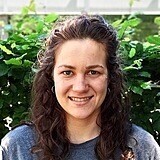
Fair decision making: From learning to predict to learning to decide
Miriam Rateike (Ph.D. Student)
With algorithmic decision making processes being increasingly being deployed in society, there are growing concerns about potential unfairness of these algorithmic systems towards people from certain demographic groups (e.g., gender). To address these concerns, the emerging field of ethical machine learning has prop...
| Primary Host: | Isabel Valera (Saarland University & Max Planck Institute for Intelligent Systems) |
| Exchange Host: | Max Welling (University of Amsterdam) |
| PhD Duration: | 15 July 2020 - 14 July 2023 |
| Exchange Duration: | 01 June 2022 - 31 December 2022 |

Fair Machine Learning Systems
Benedikt Höltgen (Ph.D. Student)
As consequential decisions affecting people's lives are increasingly being delegated to Machine Learning systems, society now needs to grapple with questions of algorithmic fairness. While this is still a fairly new area of research, similar questions have long been discussed both informally and mathematically in ne...
| Primary Host: | Bob Williamson (University of Tübingen) |
| Exchange Host: | Nuria Oliver (ELLIS Alicante Unit Foundation | Institute of Humanity-centric AI) |
| PhD Duration: | 01 September 2022 - 31 August 2025 |
| Exchange Duration: | 01 October 2024 - 31 March 2025 |
Fast feed-forward video avatars with diffusion prior
David Svitov (Ph.D. Student)
Photo-realistic human avatars are a rapidly developing area of research. However, to the best of my knowledge, all current methods have two shortcomings: Lack of human appearance prior and long training time. These shortcomings limit the applicability of photorealistic human avatars. The drawbacks described above ca...
| Primary Host: | Alessio Del Bue (Istituto Italiano di Tecnologia) |
| Exchange Host: | Lourdes Agapito (University College London) |
| PhD Duration: | 01 November 2023 - 01 June 2026 |
| Exchange Duration: | 01 January 2025 - 01 June 2025 |
Federated Semantic Segmentation architectures on IoT devices using Neural Architecture Search
Shyam Nandan Rai (Ph.D. Student)
Scene understanding is one of the key components for robotic navigation and self-driving application. Semantic segmentation gives detailed information about a scene as it involves pixel-wise dense labeling. However, semantic segmentation models are challenging to deploy on resource constraint devices due to high com...
| Primary Host: | Barbara Caputo (Politecnico di Torino & Italian Institute of Technology) |
| Exchange Host: | Zeynep Akata (University of Tübingen) |
| PhD Duration: | 01 November 2021 - 31 October 2024 |
| Exchange Duration: | 01 February 2024 - 31 October 2024 |
Feedback models for real-time robotic cloth manipulation
Oriol Barbany (Ph.D. Student)
Object rigidity is still one of the most common assumptions in robotic grasping and manipulation. Nevertheless, many daily life objects like cables, plastics, and clothes present non-negligible deformations. Manipulating garments remains a challenging topic due to the high flexibility of textiles and their nearly in...
| Primary Host: | Carme Torras (Universitat Politècnica de Catalunya) |
| Exchange Host: | Amir Zamir (EPFL) |
| PhD Duration: | 01 July 2021 - 31 May 2024 |
| Exchange Duration: | 01 January 2023 - 31 May 2023 |
Few-shot Learning with Pretrained Language Models
Abdullatif Köksal (Ph.D. Student)
Large pretrained language models (PLMs) perform well on many NLP tasks without supervised training. This phenomenon is best demonstrated in GPT-3 by its translation capability from different languages to English with just 64 contextual examples. On the other hand, contextual examples enable PLMs to work with multipl...
| Primary Host: | Hinrich Schütze (LMU Munich) |
| Exchange Host: | Anna Korhonen (University of Cambridge) |
| PhD Duration: | 01 January 2022 - 01 January 2025 |
| Exchange Duration: | 01 January 2024 - 01 July 2024 |
Fine grained visual analysis using natural language
Vestéinn Snaebjarnarson (Ph.D. Student)
The project is based around analysis of images by use of natural language, in particular for fine grained categorization and analysis. The idea is that the use of natural language will serve both as grounding for direct labelling as well as for comparison to other sources of information. Adaptation of existing gener...
| Primary Host: | Serge Belongie (University of Copenhagen & Cornell University) |
| Exchange Host: | Ryan Cotterell (ETH Zürich & University of Cambridge) |
| PhD Duration: | 01 September 2022 - 31 August 2025 |
| Exchange Duration: | 01 June 2024 - 31 December 2024 |
Flow Matching for domain translation
Luca Eyring (Ph.D. Student)
Continuous Normalizing Flows (CNFs) are a family of continuous-time deep generative models. Flow Matching (FM) has been proposed for simulation-free training of CNFs based on conditional probability paths between a source and target distribution. This enables training based upon a simple regressions objective simila...
| Primary Advisor: | Zeynep Akata (University of Tübingen) |
| Industry Advisor: | Alexey Dosovitskiy (Google) |
| PhD Duration: | 01 August 2023 - 01 August 2026 |
Foundations of Regularization in Deep Learning
Regularization lies at the core of successful training state-of-the-art deep neural networks. It allows to control overfitting and allows to obtain good generalization even with massively overparametrized models. Regularization influences the training process both implicitly - through the properties of optimizers - ...
| Primary Host: | Asja Fischer (Ruhr University Bochum) |
| Exchange Host: | Martin Jaggi (EPFL) |
| Project Duration: | 01 February 2021 - 31 March 2024 |
| Exchange Duration: | 01 June 2022 - 31 December 2022 |
Generalizeable Video Representation Learning
Michael Dorkenwald (Ph.D. Student)
Video data is a treasure trove for AI models, providing a lens to the intricate dynamics and mechanisms that define our world. The key to unlocking the tremendous amount of data available on the web is to bypass the laborious and expensive process of annotating each video. Yet, extracting knowledge and understanding...
| Primary Advisor: | Cees Snoek (University of Amsterdam) |
| Industry Advisor: | Yuki M. Asano (University of Amsterdam) |
| PhD Duration: | 01 June 2022 - 01 June 2027 |
Generative modeling and it's theoretical foundations
Simon Damm (Ph.D. Student)
Generative modeling is a fundamental yet complex task in machine and deep learning. This project aims to investigate and broaden our understanding of the theoretical foundations of (deep) generative models. Our interest is twofold. First, we are interested in theoretical properties of the optimization and training d...
| Primary Host: | Asja Fischer (Ruhr University Bochum) |
| Exchange Host: | Arthur Gretton (University College London) |
| PhD Duration: | 01 July 2021 - 30 June 2024 |
| Exchange Duration: | 01 June 2022 - 31 August 2022 01 June 2023 - 31 August 2023 |
Generative Models and Stochastic Processes
Cameron Stewart (Ph.D. Student)
This project will focus on the further development and analysis of generative models. Examples of such models include Generative Adversarial Networks (GANs), energy-based models, normalising flows, diffusion models, and score-based generative models. Wasserstein gradient flows of various metrics applied to the train...
| Primary Advisor: | Arthur Gretton (University College London) |
| Industry Advisor: | Arnaud Doucet (University of Oxford & Google DeepMind) |
| PhD Duration: | 26 September 2022 - 25 September 2026 |

Generative Models for Robust Vision
Olaf Dünkel (Ph.D. Student)
Machine learning models are validated and tested on fixed datasets under the assumption of independent and identically distributed samples, which may not fully reflect the models' true capabilities and potential vulnerabilities. These vulnerabilities can become evident when the model is tested in real-world scenario...
| Primary Host: | Christian Theobalt (Max Planck Institute for Informatics) |
| Exchange Host: | Christian Rupprecht (University of Oxford) |
| PhD Duration: | 02 October 2023 - Ongoing |
| Exchange Duration: | - Ongoing |

Generative Models for Virtual Humans
Anton Zubekhin (Ph.D. Student)
With the recent advancements in generative modelling, it is now possible to create high-quality images and videos from scratch with greater control. Simultaneously, the field of 3D reconstruction and novel view synthesis of human bodies has been rapidly developing. Despite these advancements, many challenges remain ...
| Primary Advisor: | Christian Theobalt (Max Planck Institute for Informatics) |
| Industry Advisor: | Thabo Beeler (Google) |
| PhD Duration: | 11 September 2023 - Ongoing |
Generative models in Geometric Deep Learning
Clément Vignac (Ph.D. Student)
Clément's work focuses on the design of neural architectures for structured data: sets, graphs and point clouds. These problems have in common a large symmetry group, which is the invariance to all possible permutations of the points. In order to design architectures that are both computationally and data efficient,...
| Primary Host: | Pascal Frossard (EPFL) |
| Exchange Host: | Max Welling (University of Amsterdam) |
| PhD Duration: | 01 November 2019 - 03 May 2023 |
| Exchange Duration: | 01 September 2021 - 31 December 2021 01 June 2022 - 31 July 2022 |
Generative Models with Fluid Dynamics
Chenyu Zhang (Ph.D. Student)
In generative models, the challenge lies in sampling and forming images from an original distribution, which can be reframed as a problem of transforming one distribution into another. To address this, some generative models, including normalizing flow, score matching models, and the recent flow matching methods are...
| Primary Host: | Nicu Sebe (University of Trento) |
| Exchange Host: | Max Welling (University of Amsterdam) |
| PhD Duration: | 01 November 2023 - 30 April 2027 |
| Exchange Duration: | 01 March 2024 - 01 September 2024 |
Generative/Stochastic/Bayesian Space-Time Neural Networks
Ilze Amanda Auzina (Ph.D. Student)
The PhD project explores the intersection between machine learning and dynamical systems. Throughout the project multiple research directions are investigated. Firstly, the effect of constraining networks with known dynamical properties is researched. Secondly, the project explores dynamical forecasting when the und...
| Primary Host: | Efstratios Gavves (University of Amsterdam) |
| Exchange Host: | Matthias Bethge (University of Tübingen) |
| PhD Duration: | 01 October 2021 - 01 October 2025 |
| Exchange Duration: | 01 February 2025 - 01 September 2025 |

Geometric and statistical software engineering tools in array-centric programming
Joanna Sliwa (Ph.D. Student)
In the course of training neural networks, the evaluation of the training process is often solely based on the determined loss. Prior research has attempted to incorporate software engineering tools to enable an assessment beyond just the gradient, perform it efficiently, and offer a more comprehensible evaluation o...
| Primary Host: | Philipp Hennig (University of Tübingen) |
| Exchange Host: | José Miguel Hernández-Lobato (University of Cambridge) |
| PhD Duration: | 15 June 2023 - 14 June 2026 |
| Exchange Duration: | 01 June 2024 - 01 December 2024 |

Geometric Deep Learning
Gabriele Cesa (Ph.D. Student)
Many machine learning tasks come with some intrinsic geometric structure. During my PhD, I will study how to encode the geometry of a problem into neural-network architectures to achieve improved data efficiency and generalization. A particular focus will be given to 3D data and the task of 3D reconstruction, where ...
| Primary Advisor: | Max Welling (University of Amsterdam) |
| Industry Advisor: | Taco Cohen (Qualcomm AI Research) |
| PhD Duration: | 01 September 2019 - 30 September 2023 |
Geometrie deep learning for shape correspondence, graph data and quantum chemistry
Christian Koke (Ph.D. Student)
A classic task in Computer vision is finding correspondences between geometric shapes, often represented via triangle graphs. Algorithms achieving state of the art performance on this task built on two key ingredients: A) The generation of informative local (geometry-capturing) features. B) A global transfer schem...
| Primary Host: | Daniel Cremers (Technical University of Munich) |
| Exchange Host: | Michael Bronstein (University of Oxford) |
| PhD Duration: | 01 September 2022 - 31 August 2026 |
| Exchange Duration: | 01 September 2023 - 29 February 2024 |
Graph-based Learning from Irregular Spatiotemporal Data
Ivan Marisca (Ph.D. Student)
Irregular spatiotemporal data, characterized by collections of asynchronous observations at different time instants and spatial coordinates, pose a complex challenge in data analysis. These structured data are commonly encountered in sensor networks, such as environmental monitoring networks, traffic management syst...
| Primary Host: | Cesare Alippi (Università della Svizzera italiana, IDSIA USI-SUPSI & Politecnico di Milano) |
| Exchange Host: | Michael Bronstein (University of Oxford) |
| PhD Duration: | 01 September 2020 - 30 June 2025 |
| Exchange Duration: | 01 March 2024 - 31 August 2024 |
Grounding symbols in observations via causal, object centric world-models
Anson Lei (Ph.D. Student)
Symbol grounding is a key part of classical AI and harbours significant potential in the ability to perform symbolic and causal reasoning on real-world data. In contrast, machine learning currently operates on raw sensor data and typically without consideration of any symbolic structure in the data. The recent emerg...
| Primary Host: | Ingmar Posner (University of Oxford) |
| Exchange Host: | Bernhard Schölkopf (ELLIS Institute Tübingen & Max Planck Institute for Intelligent Systems) |
| PhD Duration: | 01 October 2021 - 30 April 2026 |
| Exchange Duration: | - Ongoing |
Hardware-oriented Neural Architecture Search
Luca Robbiano (Ph.D. Student)
Manual neural architecture design is a time-consuming process that requires a massive effort by experts. In the last few years, this led to the development of Neural Architecture Search algorithms, which aim to replace the traditional design approach with more efficient automated methods. This is even more relevant ...
| Primary Host: | Barbara Caputo (Politecnico di Torino & Italian Institute of Technology) |
| Exchange Host: | Fabio Maria Carlucci (Facebook) |
| PhD Duration: | 01 November 2021 - 31 October 2024 |
| Exchange Duration: | 01 February 2024 - 31 August 2024 |
Harmonic Analysis for Stochastic Neural Networks
Adeel Pervez (Ph.D. Student)
In this work we explore harmonic analytic techniques to improve the learning capabilities of stochastic neural network models. Stochastic neural networks are widely used in probabilistic modeling for unsupervised and representation learning. Such models are often limited by problems of instability and by the type of...
| Primary Advisor: | Efstratios Gavves (University of Amsterdam) |
| Industry Advisor: | Taco Cohen (Qualcomm AI Research) |
| PhD Duration: | 01 February 2019 - 31 January 2023 |
Holistic 3D Scene Understanding for Self-Driving Cars
Zehao Yu (Ph.D. Student)
Holistic 3D scene understanding plays a critical role in self-driving cars. It involves several sub-tasks, such as geometric layout estimation, object detection, recognition, and tracking. While each sub-task may be solved independently, it would be beneficial to utilize the complementary nature of different sub-tas...
| Primary Host: | Andreas Geiger (University of Tübingen & Max Planck Institute for Intelligent Systems) |
| Exchange Host: | Torsten Sattler (Czech Technical University) |
| PhD Duration: | 01 September 2021 - 30 June 2025 |
| Exchange Duration: | 01 December 2022 - 31 May 2023 |
Holistic Approaches for Dynamic Scene Understanding
Maximilian Luz (Ph.D. Student)
Perception—and, in a more direct sense, dynamic scene understanding—is fundamental to the success of autonomous robots. Adequately capturing and representing environmental complexity and dynamics in a reliable and robust manner is critical to subsequent tasks such as (local) navigation and planning, especially in en...
| Primary Host: | Abhinav Valada (University of Freiburg) |
| Exchange Host: | () |
| PhD Duration: | 01 July 2023 - 30 June 2027 |
| Exchange Duration: | 01 July 2025 - 31 December 2025 |
Human body motion generation
Mathis Petrovich (Ph.D. Student)
Automatic analysis of people from visual data is of great importance for numerous applications in behavior analysis and prediction, autonomous driving, health care, surveillance, content search, and entertainment. More specifically, analyzing human body dynamics is an essential component of various research directio...
| Primary Host: | Gül Varol (École des Ponts ParisTech) |
| Exchange Host: | Michael J. Black (Max Planck Institute for Intelligent Systems) |
| PhD Duration: | 01 October 2020 - 30 September 2023 |
| Exchange Duration: | 01 April 2022 - 30 September 2023 |
Human Modeling via Reinforcement Learning and Computer Vision
Berat Mert Albaba (Ph.D. Student)
Modeling and imitating human behaviors, actions and decisions from visual data are crucial for the future of AI, yet problematic due to the complexity of humans. In this project, the goal is proposing approaches to model and imitate humans in a generative manner. Thanks to its well adaptation ability to new scenario...
| Primary Host: | Otmar Hilliges (ETH Zürich) |
| Exchange Host: | Michael J. Black (Max Planck Institute for Intelligent Systems) |
| PhD Duration: | 01 July 2022 - 15 July 2026 |
| Exchange Duration: | 01 December 2023 - 01 June 2024 |

Human Motion Capture and Motion Modeling in Context using Multi-modal Sensing
Andrea Boscolo Camiletto (Ph.D. Student)
In this project, we will explore new ways to reconstruct and model detailed human motion and action in the context of the physical surroundings they happen in. We will explore several research strands in this space. We will explore new types of multi-modal sensing that combine cameras, including body-worn cameras, w...
| Primary Advisor: | Christian Theobalt (Max Planck Institute for Informatics) |
| Industry Advisor: | Thabo Beeler (Google) |
| PhD Duration: | 15 October 2023 - Ongoing |

Human-centric Explainable AI
Julien Colin (Ph.D. Student)
The goal of Explainable AI (XAI) is to develop methods that explain to humans how AI models behave so humans (including non-experts) can understand the basis for the algorithm’s decisions. Within the computer vision literature, the most widely used explainable AI methods are attribution methods. Recent works on huma...
| Primary Host: | Nuria Oliver (ELLIS Alicante Unit Foundation | Institute of Humanity-centric AI) |
| Exchange Host: | Thomas Serre (Artificial & Natural Intelligence Toulouse Institute & Brown University) |
| PhD Duration: | 01 November 2022 - 30 June 2026 |
| Exchange Duration: | 01 June 2024 - 31 December 2024 |

Human-centric Machine Learning in Healthcare
Nina Corvelo Benz (Ph.D. Student)
With machine learning tools being widely used in social and commerce systems and increasingly also to automate processes in other sectors such as medicine, banking, and employment, machine-made decisions are becoming more and more influential to our everyday life. In many of these real-world applications algorithms’...
| Primary Host: | Manuel Gomez Rodriguez (Max Planck Institute for Software Systems) |
| Exchange Host: | Karsten Borgwardt (Max Planck Institute of Biochemistry) |
| PhD Duration: | 01 June 2021 - 30 June 2025 |
| Exchange Duration: | 01 January 2023 - 30 June 2023 |
Implicit Generation of Graph Structures
Gbètondji Dovonon (Ph.D. Student)
Graphs are natural representations for data in a wide array of applications, ranging from materials science to algorithm design. Often however, these graphs are not available in data: e.g., a potential library of ideal catalysts may not have known synthesis graphs required to construct them. In this project our goal...
| Primary Advisor: | Matt J. Kusner (University College London) |
| Industry Advisor: | Michael Bronstein (University of Oxford) |
| PhD Duration: | 01 September 2022 - 31 May 2026 |
Improving Deep Learning Explainability with Interpretable Outputs and Representations
Anders Christensen (Ph.D. Student)
Through recent years it has become abundantly clear how powerful machine learning is. Still, despite the empirical success of deep learning models, there is rarely access to the reasoning behind why a model yields a certain output for some input. Achieving more insight into the decision making of such models and dev...
| Primary Host: | Ole Winther (University of Copenhagen & Technical University of Denmark) |
| Exchange Host: | Zeynep Akata (University of Tübingen) |
| PhD Duration: | 01 December 2021 - 30 November 2024 |
| Exchange Duration: | 01 September 2022 - 31 August 2023 |
Incremental Learning in Semantic Segmentation
Fabio Cermelli (Ph.D. Student)
Semantic Segmentation is a crucial task in computer vision that consists of predicting for each pixel of an image its semantic meaning, i.e. pixel-wise classification. This task is crucial for many applications, ranging from self-driving cars to autonomous manufacturing. In the last years, thanks to the rise of deep...
| Primary Host: | Barbara Caputo (Politecnico di Torino & Italian Institute of Technology) |
| Exchange Host: | Matthieu Cord (Sorbonne University) |
| PhD Duration: | 01 November 2019 - 31 January 2023 |
| Exchange Duration: | 15 March 2022 - 15 September 2022 |
Independent causal mechanisms in machine learning
Julius von Kügelgen (Ph.D. Student)
Due to changes in environment, measurement device, experimental condition, or sample selection bias, the commonly-made assumption of independent and identically distributed (i.i.d.) random variables underlying many machine learning algorithms is often violated in practice. The perspective of causal modelling offers ...
| Primary Host: | Bernhard Schölkopf (ELLIS Institute Tübingen & Max Planck Institute for Intelligent Systems) |
| Exchange Host: | Adrian Weller (University of Cambridge & The Alan Turing Institute) |
| PhD Duration: | 01 September 2018 - 28 February 2023 |
| Exchange Duration: | 01 September 2018 - 31 August 2019 |
Inductive and Semantic Priors for Categorization in Deep Learning
Tejaswi Kasarla (Ph.D. Student)
An inductive bias of a learning algorithm describes a set of assumptions about the target function independent of training data. Inductive biases play a vital role in the design of machine learning algorithms, consider for example inductive biases for image structures ( e.g., the convolution operator), symmetries (e...
| Primary Host: | Pascal Mettes (University of Amsterdam) |
| Exchange Host: | Rita Cucchiara (Università di Modena e Reggio Emilia) |
| PhD Duration: | 01 October 2021 - 01 October 2025 |
| Exchange Duration: | 01 September 2023 - 30 November 2023 01 January 2025 - 31 March 2025 |
Interactive AI with a Theory of Mind
Mustafa Mert Çelikok (Ph.D. Student)
In human-AI collaboration, learning a good model of the human is important for an autonomous learning system which aims to help its users in the most efficient way possible. Unfortunately, the data in human-AI interaction is scarce due to the online nature of the tasks. Additional difficulties arise from the bounded...
| Primary Host: | Samuel Kaski (Aalto University, Finnish Centre for AI & University of Manchester) |
| Exchange Host: | Frans A. Oliehoek (Delft University of Technology) |
| PhD Duration: | 01 February 2019 - 01 February 2023 |
| Exchange Duration: | 15 September 2020 - 15 March 2021 |
Interactive Multimodal Learning
Haau-Sing Li (Ph.D. Student)
Multimodal learning contains a set of challenging tasks. It requires a deep understanding of all relevant modalities (language, vision, software program) and of the relationships between them. Furthermore, the lack of high-quality datasets increases the difficulty of related tasks. In this project, we will work with...
| Primary Host: | Iryna Gurevych (Technical University of Darmstadt) |
| Exchange Host: | André Martins (University of Lisbon) |
| PhD Duration: | 01 July 2021 - 30 June 2025 |
| Exchange Duration: | 01 July 2023 - 30 June 2024 |

Interpretable Machine Learning
Jonas Klesen (Ph.D. Student)
Issues around the interpretability of Machine Learning systems are of growing concern. Unfortunately, the research community up until now has failed to converge on established methods for arriving at powerful yet interpretable models. Even worse, and as opposed to similar desiderata of Machine Learning s...
| Primary Host: | Isabel Valera (Saarland University & Max Planck Institute for Intelligent Systems) |
| Exchange Host: | Novi Quadrianto (University of Sussex) |
| PhD Duration: | 01 September 2021 - 01 September 2024 |
| Exchange Duration: | - Ongoing |
Interpretable Machine Learning for Hydrological Drought Understanding
Georgios Blougouras (Ph.D. Student)
Climate change and direct human activities are profoundly influencing the water cycle through complex interactions, couplings, and feedback mechanisms. An acceleration of the terrestrial component of the water cycle implies increased frequency of hydrological droughts, whose characteristics are also altered in respo...
| Primary Host: | Markus Reichstein (Max Planck Institute for Biogeochemistry) |
| Exchange Host: | Mirco Migliavacca (European Commission Joint Research Centre) |
| PhD Duration: | 15 August 2023 - 14 August 2026 |
| Exchange Duration: | 15 April 2024 - 15 October 2024 |
Interpretable ML for stress forecasting and management
Batuhan Koyuncu (Ph.D. Student)
Modeling temporal stress patterns of people is a challenging task since stress patterns are complex and have a heterogeneous nature. However, it is a crucial task for forecasting and mitigating stress. The objectives of this Ph.D. project are understanding stress causes, forecasting stress levels over time, and prov...
| Primary Host: | Isabel Valera (Saarland University & Max Planck Institute for Intelligent Systems) |
| Exchange Host: | Ole Winther (University of Copenhagen & Technical University of Denmark) |
| PhD Duration: | 20 September 2021 - Ongoing |
| Exchange Duration: | - Ongoing |
Interpretable Representation Learning using Generative Models
Silpa Vadakkeeveetil Sreelatha (Ph.D. Student)
Generative models have witnessed significant performance improvements in image synthesis over the last decade with the introduction of the generative adversarial network (GAN), variational autoencoder (VAE), and Diffusion models. Extensive research has been carried out to demonstrate their utility in applications su...
| Primary Host: | Anjan Dutta (University of Surrey) |
| Exchange Host: | Serge Belongie (University of Copenhagen & Cornell University) |
| PhD Duration: | 01 July 2023 - 31 December 2026 |
| Exchange Duration: | 01 April 2025 - 30 September 2025 |
Interpretable uncertainty in NLP systems using human uncertainty
Joris Baan (Ph.D. Student)
Accurate and reliable representations of uncertainty are crucial in trustworthy NLP systems. For example, to pass uncertain predictions on to human experts or convey uncertainty to users to help them interpret predictions. However, it is not straightforward to evaluate uncertainty, partly because uncertainty is rare...
| Primary Host: | Raquel Fernández (University of Amsterdam) |
| Exchange Host: | Barbara Plank (LMU Munich & IT University of Copenhagen) |
| PhD Duration: | 01 October 2021 - 30 September 2025 |
| Exchange Duration: | 01 February 2022 - 31 May 2022 |
Interpreting NLP models through the lens of cognition and linguistics
Michael Hanna (Ph.D. Student)
Transformer-based models have spurred unprecedented increases in performance on NLP tasks. As these models' performance begins to approach (or even surpass) that of humans, the question of how they achieve this performance becomes crucial. Do these models acquire the same linguistic knowledge, and learn to perform t...
| Primary Host: | Sandro Pezzelle (University of Amsterdam) |
| Exchange Host: | Yonatan Belinkov (Technion) |
| PhD Duration: | 01 September 2022 - 31 August 2026 |
| Exchange Duration: | 01 September 2023 - 01 March 2024 |
Intrinisic structural properties of neural networks and their effect on generalization
Sidak Pal Singh (Ph.D. Student)
The main aim of this doctoral thesis is to better understand the properties and mechanisms underlying the success of deep neural networks. In particular, our emphasis is on identifying relevant structural properties of neural networks that are inherently at play and then utilize them to holistically investigate the ...
| Primary Host: | Thomas Hofmann (ETH Zürich) |
| Exchange Host: | Bernhard Schölkopf (ELLIS Institute Tübingen & Max Planck Institute for Intelligent Systems) |
| PhD Duration: | 01 September 2020 - 31 August 2024 |
| Exchange Duration: | 01 September 2021 - 31 August 2022 |
Intrinsic and Invariant Image Decomposition
Xiaoyan Xing (Ph.D. Student)
Intrinsic and invariant information are fundamental components of the image formation process. In fact, the image formation heavily depends on the geometry of the scene, object material, and illumination. To decompose the image into its constituent parts, well-awareness of the geometry information in the scene and t...
| Primary Advisor: | Theo Gevers (University of Amsterdam) |
| Industry Advisor: | Jan Hendrik Metzen (Bosch Center for AI) |
| PhD Duration: | 01 September 2022 - 31 August 2026 |
Invariance and Causality in Machine Learning
Cian Eastwood (Ph.D. Student)
Machine learning (ML) methods have achieved remarkable successes on problems with independent and identically-distributed (IID) data. However, real-world data is not IID—environments change, experimental conditions shift, and new measurement devices are used. Current ML methods struggle when asked to transfer or ada...
| Primary Host: | Chris Williams (University of Edinburgh & The Alan Turing Institute) |
| Exchange Host: | Bernhard Schölkopf (ELLIS Institute Tübingen & Max Planck Institute for Intelligent Systems) |
| PhD Duration: | 01 September 2018 - 30 September 2022 |
| Exchange Duration: | 01 April 2021 - 28 February 2022 |

Investigating and preventing harmful cultural implications of AI in social media
Piera Riccio (Ph.D. Student)
Social media platforms are reshaping the flow of information in our society, establishing new paradigms of mass communication. Because of their ubiquitous nature, they constantly influence our daily choices, having a widespread impact on different facets of our culture. On such platforms, AI algorithms are massively...
| Primary Host: | Nuria Oliver (ELLIS Alicante Unit Foundation | Institute of Humanity-centric AI) |
| Exchange Host: | Thomas Hofmann (ETH Zürich) |
| PhD Duration: | 01 November 2021 - 01 November 2024 |
| Exchange Duration: | - Ongoing |
Irrational Human Behaviour and AI
Aditya Gulati (Ph.D. Student)
Humans have been known to exhibit irrational behaviour in many situations. Our current AI systems however, are not well equipped to deal with or understand these types of behaviour. Our goal is to build an understanding of these irrational behaviours into our AI systems in order to design tools that can help us make...
| Primary Host: | Nuria Oliver (ELLIS Alicante Unit Foundation | Institute of Humanity-centric AI) |
| Exchange Host: | Bruno Lepri (FBK & MIT Media Lab) |
| PhD Duration: | 01 December 2021 - 31 December 2025 |
| Exchange Duration: | - Ongoing |
Joint Sentence and Word Alignment
Peiqin Lin (Ph.D. Student)
Word alignment is generally decomposed into two subproblems: first align sentences, then align words on the assumption that only words in aligned sentences can be aligned. This decomposition works well for many genres of parallel corpora, in particular, for parliamentary proceedings and for legal and business text. ...
| Primary Host: | Hinrich Schütze (LMU Munich) |
| Exchange Host: | André Martins (University of Lisbon) |
| PhD Duration: | 01 October 2021 - 30 September 2024 |
| Exchange Duration: | 01 October 2022 - 31 March 2023 |
Large generative vision models for content creation and representation learning
Saman Motamed (Ph.D. Student)
l'm broadly interested in Generative Vision models for content creation and representation learning. My research falls in to the following two categories: 1) I aim to gain a better understanding of how to enable user-intuitive control over generative models for personalized content creation with limited data. This i...
| Primary Host: | Luc Van Gool (ETH Zürich & KU Leuven) |
| Exchange Host: | Andrea Vedaldi (University of Oxford) |
| PhD Duration: | 01 April 2023 - 01 April 2027 |
| Exchange Duration: | 01 April 2025 - 30 September 2025 |
Latent Communication in Artificial Neural Networks
Luca Moschella (Ph.D. Student)
As neural networks permeate various scientific and industrial domains, understanding the universality and reusability of their representations becomes crucial. At their core, these networks create intermediate encodings or representations of input data and subsequently leverage them to perform specific downstream ta...
| Primary Host: | Emanuele Rodolà (Sapienza University of Rome) |
| Exchange Host: | Francesco Locatello (IST Austria) |
| PhD Duration: | 01 November 2020 - 01 April 2024 |
| Exchange Duration: | 01 October 2023 - 01 May 2024 |
Learning cloth handling skills with Gaussian Processes and Model Predictive Control
Robot learning of cloth handling skills is an increasingly relevant task, that arises in the field of assistive robotics. However, it presents numerous challenges, related both to the non-rigid nature of the object to be manipulated, and to the type of real-world datasets used to learn these skills, which usually co...
| Primary Host: | Carme Torras (Universitat Politècnica de Catalunya) |
| Exchange Host: | Lorenzo Rosasco (University of Genoa, Italian Institute of Technology & Massachusetts Institute of Technology) |
| Project Duration: | 16 June 2021 - 16 June 2024 |
| Exchange Duration: | 01 June 2022 - 01 December 2022 |
Learning compact and efficient feature representations
Zhuo Su (Ph.D. Student)
Energy efficient sensing and computing is vital at all levels, from the smallest sensor like the chip to ultra high performance processors and systems like the cloud, especially in the post Moore's Law era. Energy efficient AI enables AI to move beyond the cloud and to reach the edge, which is critical to the progre...
| Primary Host: | Li Liu (University of Oulu) |
| Exchange Host: | Max Welling (University of Amsterdam) |
| PhD Duration: | 01 October 2018 - 31 December 2022 |
| Exchange Duration: | 01 October 2021 - 31 March 2022 |
Learning Curricula in Open-Ended Worlds
Minqi Jiang (Ph.D. Student)
Adaptive curricula have played a pivotal role in successfully applying deep reinforcement learning (RL) to the most challenging domains. By presenting RL agents with variations of the external world that best challenge their present capabilities, adaptive curricula can greatly improve how quickly agents learn,...
| Primary Advisor: | Laura Toni (University College London) |
| Industry Advisor: | Tim Rocktäschel (University College London & Google DeepMind) |
| PhD Duration: | 01 April 2022 - 01 October 2023 |
Learning from Context with Generative Models
Ivona Najdenkoska (Ph.D. Student)
Empowered by the large-scale pre-training on huge webscraped datasets, large language models (LLMs) have witnessed major advancements in recent years. These models demonstrate fascinating emergent abilities, particularly learning from a few examples presented in prompt with no gradient updates, also known as in-cont...
| Primary Advisor: | Marcel Worring (University of Amsterdam) |
| Industry Advisor: | Xiantong Zhen (University of Amsterdam & Inception Institute of Artificial Intelligence) |
| PhD Duration: | 01 April 2020 - 17 August 2024 |
Learning from distributions with kernelized optimal transport
Dimitri Meunier (Ph.D. Student)
The problem of learning functions over spaces of probabilities -- or distribution regression -- is gaining significant interest in the machine learning community. A key challenge behind this problem is to identify a suitable representation capturing all relevant properties of the underlying functional mapping. A pri...
| Primary Host: | Arthur Gretton (University College London) |
| Exchange Host: | Gabriel Peyré (CNRS, DMA & École Normale Supérieure) |
| PhD Duration: | 05 October 2021 - 31 August 2025 |
| Exchange Duration: | 01 June 2023 - 31 August 2023 01 June 2024 - 31 August 2024 |
Learning from multiple distributions
Maximilian Beck (Ph.D. Student)
Traditional deep learning methods perform well in single-domain settings where a vast amount of data is available, but fail in applications where labeled data is limited and comes from different domains. This is for example the case when industrial sensor systems need adjustments to new operating conditions or when ...
| Primary Host: | Sepp Hochreiter (Johannes Kepler University Linz) |
| Exchange Host: | Gerhard Neumann (Karlsruhe Institute of Technology) |
| PhD Duration: | 01 July 2021 - Ongoing |
| Exchange Duration: | 01 February 2024 - 01 August 2024 |
Learning Meaningful Object Representations
Frederik Nolte (Ph.D. Student)
A fundamental aspect of human cognition is interpreting their surrounding environment as a collection of objects and the relations among them. What an object means to us is not only characterised by its physical properties, but crucially entails its affordances, informing us what kind of actions can be executed on a...
| Primary Host: | Ingmar Posner (University of Oxford) |
| Exchange Host: | Bernhard Schölkopf (ELLIS Institute Tübingen & Max Planck Institute for Intelligent Systems) |
| PhD Duration: | 01 October 2023 - 01 March 2027 |
| Exchange Duration: | 01 January 2026 - 01 July 2026 |
Learning methods for geometry and appearance reconstruction
Božidar Antić (Ph.D. Student)
As XR technologies are gaining more traction, estimating detailed geometry and appearance of scenes and humans is becoming a crucial task in order to have realistic and interactive virtual experiences. The majority of today's methods focus only on reconstructing geometry and simple textures. However, estimation of u...
| Primary Host: | Andreas Geiger (University of Tübingen & Max Planck Institute for Intelligent Systems) |
| Exchange Host: | Siyu Tang (ETH Zürich) |
| PhD Duration: | 01 December 2021 - 31 October 2025 |
| Exchange Duration: | 01 June 2023 - 30 November 2023 |
Learning of hidden principled mechanisms behind data without supervision
Takeru Miyato (Ph.D. Student)
In the past, various neural networks models have been developed based on the in-distribution performance on benchmark datasets like ImageNet. However, in many cases, the data in real applications differs from the dataset on which the model was trained because of the change in the mechanisms behind the dataset. In or...
| Primary Host: | Andreas Geiger (University of Tübingen & Max Planck Institute for Intelligent Systems) |
| Exchange Host: | Max Welling (University of Amsterdam) |
| PhD Duration: | 01 September 2022 - 31 August 2026 |
| Exchange Duration: | 01 September 2024 - 31 August 2025 |

Learning on Graph Problems in Biology
Paolo Pellizzoni (Ph.D. Student)
Developing machine learning methods for graph-structured data is a theme of paramount importance in bioinformatics. Indeed, graphs are the structure of choice for representing complex objects such as molecules and proteins, which have a central role in many biological problems, as well as for capturing the interacti...
| Primary Host: | Karsten Borgwardt (Max Planck Institute of Biochemistry) |
| Exchange Host: | Roland Kwitt (University of Salzburg) |
| PhD Duration: | 01 October 2022 - 01 October 2025 |
| Exchange Duration: | 01 September 2024 - 01 March 2025 |
Learning real-world perception in simulations
Xu Chen (Ph.D. Student)
The difficulty of acquiring annotated real-world data has limited the applicability of deep learning in many computer vision tasks. As one way to overcome this limitation, training deep networks with synthetic images from simulation has demonstrated its potential. However, current simulations still lack diversity an...
| Primary Host: | Otmar Hilliges (ETH Zürich) |
| Exchange Host: | Andreas Geiger (University of Tübingen & Max Planck Institute for Intelligent Systems) |
| PhD Duration: | 01 March 2019 - 28 February 2023 |
| Exchange Duration: | 01 January 2021 - 31 December 2021 |
Learning Robot Perception and Localization with Limited Supervision
Julia Hindel (Ph.D. Student)
Comprehensive scene understanding and state estimation are pivotal for achieving reliable robot autonomy in human-centred environments. Yet, the availability of reliable training data undermines the robustness - and thus safety - of such systems, especially in edge cases not or barely covered. This project focuses o...
| Primary Host: | Abhinav Valada (University of Freiburg) |
| Exchange Host: | Paul Newman (University of Oxford) |
| PhD Duration: | 01 September 2022 - 31 August 2026 |
| Exchange Duration: | 01 September 2024 - 28 February 2025 |

Learning Stocastic Dynamical Systems
Erfan Mirzaei (Ph.D. Student)
Dynamical systems are mathematical models used to describe the evolution of state variables over time. These models, often represented by nonlinear differential equations (ordinary or partial), and possibly stochastic, have wide-ranging applications in science and engineering. This project aims to investigate data-d...
| Primary Host: | Massimiliano Pontil (Istituto Italiano di Tecnologia & University College London) |
| Exchange Host: | Karim Lounici (École Polytechnique) |
| PhD Duration: | 01 November 2023 - Ongoing |
| Exchange Duration: | - Ongoing |

Learning to solve Differential Equations with Uncertainty
Emilia Magnani (Ph.D. Student)
Learning differential equations is an emerging research theme in machine learning. Differential equations are interesting because they offer a powerful language for dynamical relationships between variables and a mechanism for reduction for structured models, which is especially relevant in science. The project will...
| Primary Host: | Philipp Hennig (University of Tübingen) |
| Exchange Host: | Lorenzo Rosasco (University of Genoa, Italian Institute of Technology & Massachusetts Institute of Technology) |
| PhD Duration: | 01 December 2020 - 30 November 2023 |
| Exchange Duration: | 01 December 2021 - 28 February 2022 01 December 2022 - 28 February 2023 |
Learning to solve multiple-view geometry
Diana Sungatullina (Ph.D. Student)
Multi-view geometry is an important field in computer vision and robotics, which provides an understanding to the foundations of the subject. The development of this field has, however, not yet been greatly influenced by the recent advances in machine learning and geometrical machine learning in particular. We aim a...
| Primary Host: | Tomas Pajdla (Czech Technical University) |
| Exchange Host: | Konrad Schindler (ETH Zürich) |
| PhD Duration: | 01 February 2022 - 01 February 2026 |
| Exchange Duration: | 01 February 2024 - 01 August 2024 |

Learning with Geometry on real world data
Marco Pegoraro (Ph.D. Student)
This PhD project delves into harnessing the intrinsic geometric properties of data to amplify learning tasks, with a primary focus on biological data. Traditional Euclidean models often prove inadequate in capturing the intricate structures inherent in real-world data. Consequently, we delve into nuanced spaces th...
| Primary Host: | Emanuele Rodolà (Sapienza University of Rome) |
| Exchange Host: | Alex Bronstein (Technion) |
| PhD Duration: | 01 November 2021 - 30 September 2025 |
| Exchange Duration: | 01 March 2023 - 01 August 2023 |
Learning with Limited Data
Yingjun Du (Ph.D. Student)
In clinical practices, massive annotations are difficult to acquire in some conditions where specialized biomedical expert knowledge is required. Inspired by the human ability to learn new tasks quickly from a small number of examples, few-shot learning attempts to address the challenge of training artificial intelli...
| Primary Advisor: | Cees Snoek (University of Amsterdam) |
| Industry Advisor: | Xiantong Zhen (University of Amsterdam & Inception Institute of Artificial Intelligence) |
| PhD Duration: | 01 June 2020 - 31 May 2024 |

Learning-based 3D Approach for Egocentric Vision
Weirong Chen (Ph.D. Student)
Egocentric vision, which involves understanding and interpreting visual data from a first-person perspective, is crucial for various applications, including augmented reality, robotics, and assistive technologies. This project seeks to advance the current state of visual foundation models while addressing challenges...
| Primary Host: | Daniel Cremers (Technical University of Munich) |
| Exchange Host: | Andrea Vedaldi (University of Oxford) |
| PhD Duration: | 01 October 2023 - 30 September 2027 |
| Exchange Duration: | 01 February 2025 - 31 July 2025 |
Learning-Based Approach for Non-Linear Applied Control
Rishabh Dev Yadav (Ph.D. Student)
Non-linear control systems are widely used in many real-world applications, such as robotics, aerospace, and power systems. Despite their widespread use, these systems often face significant challenges in achieving accurate and reliable control performance. This is due to the complex and unpredictable nature of non-...
| Primary Host: | Wei Pan (University of Manchester) |
| Exchange Host: | Sihao Sun (Delft University of Technology) |
| PhD Duration: | 01 October 2023 - 31 December 2027 |
| Exchange Duration: | 01 January 2025 - 31 December 2025 |
lmproving Image Synthesis and Manipulation Control with GANs
Edgar Schönfeld (Ph.D. Student)
Among the major challenges of generative adversarial networks (GANs) remain the ability to create images that are indistinguishable from real images and the ability to depict precisely the content specified by the user. To this end, this work proposes methods to improve synthesis quality and maximize control over th...
| Primary Advisor: | Bernt Schiele (Max Planck Institute for Informatics & Saarland University) |
| Industry Advisor: | Anna Khoreva (Bosch Center for AI) |
| PhD Duration: | 01 April 2019 - 30 September 2022 |
Long-Horizon Dexterous Manipulation from Demonstration
Adrian Röfer (Ph.D. Student)
Everyday human environments are highly complex in both structure, and appearance. Nonetheless, we would like to move towards a world in which robots can assist and support humans in these environments. As a part of my PhD, I will move us one step along this path by making robotic manipulation more dexterous and ada...
| Primary Host: | Abhinav Valada (University of Freiburg) |
| Exchange Host: | Sethu Vijayakumar (University of Edinburgh & The Alan Turing Institute) |
| PhD Duration: | 01 June 2021 - 31 May 2025 |
| Exchange Duration: | 01 June 2023 - 30 November 2023 |
Long-Horizon Planning and Reasoning for Intelligent Robotic Systems
Imen Mahdi (Ph.D. Student)
Vision Language Action (VLA) models have been proposed to enable robots to execute a variety of tasks by integrating perception, language understanding, and action planning. Large VLAs trained on a diverse set of tasks have been shown to generalize well to new tasks and environments, achieving high precision and eff...
| Primary Host: | Abhinav Valada (University of Freiburg) |
| Exchange Host: | Cordelia Schmid (INRIA) |
| PhD Duration: | 01 October 2024 - 30 September 2028 |
| Exchange Duration: | 01 September 2025 - 31 March 2026 |
Machine Learning and Causal Inference to Optimize Genomic Interventions using Disease State Representations
Bowen Fan (Ph.D. Student)
The human genome contains a torrent of information that gives clues not only about human origin, evolution, biological function, but also diseases. The goal of my project aims at developing novel machine learning techniques to better understand the complex genomic data and also other forms of data that can represent...
| Primary Host: | Karsten Borgwardt (Max Planck Institute of Biochemistry) |
| Exchange Host: | Kristel Van Steen (University of Liège & KU Leuven) |
| PhD Duration: | 01 March 2020 - 31 December 2022 |
| Exchange Duration: | 01 November 2020 - 31 January 2021 |
Machine learning approach for multi-scale genomics problems
Olga Mineeva (Ph.D. Student)
In the age of rapid growth of available biological sequencing data enabled by the recent advances in sequencing technologies, there is an opportunity to answer biological and health-related questions at a more detailed level. At the same time, the amount of data allows the use of sophisticated methods, such that dee...
| Primary Host: | Gunnar Rätsch (ETH Zürich) |
| Exchange Host: | Isabel Valera (Saarland University & Max Planck Institute for Intelligent Systems) |
| PhD Duration: | 01 November 2018 - 31 October 2022 |
| Exchange Duration: | 01 January 2020 - 30 June 2020 |
Machine Learning for Biological Network Analysis
Giulia Muzio (Ph.D. Student)
The main objective of my project is to develop methods for network-based genome-wide association studies (GWAS) that combine computational efficiency, statistical power and interpretability, thereby enabling the discovery of biological pathways underlying complex phenotypic traits. GWAS aim to identify statistical ...
| Primary Host: | Karsten Borgwardt (Max Planck Institute of Biochemistry) |
| Exchange Host: | Volker Tresp (LMU Munich & Siemens) |
| PhD Duration: | 01 September 2019 - 31 August 2022 |
| Exchange Duration: | 01 February 2021 - 30 April 2021 |
Machine learning for improving climate models
Fernando Iglesias-Suarez (PostDoc)
Earth system and climate models are fundamental to understanding and projecting climate change. Although they have improved significantly over the last decades, considerable biases compared to observations and uncertainties in their projections still remain. We will take a new approach by harvesting output from high...
| Primary Host: | Veronika Eyring (German Aerospace Center (DLR) & University of Bremen) |
| Exchange Host: | Gustau Camps-Valls (Universitat de València) |
| PostDoc Duration: | 01 December 2019 - 31 December 2024 |
| Exchange Duration: | 01 September 2022 - 31 May 2024 20 March 2023 - 21 April 2023 |

Machine Learning for Single-Cell Omics
Merel Kuijs (Ph.D. Student)
In spite of the massive effort in ensuring drug safety and efficacy, some drugs fail to achieve a therapeutic effect and others have severe side effects. A personalized approach to medicine is needed to maximize every patient’s chance of recovery and relieve pressure on healthcare systems, but data to inform precisi...
| Primary Host: | Fabian Theis (Helmholtz Center Munich) |
| Exchange Host: | Karsten Borgwardt (Max Planck Institute of Biochemistry) |
| PhD Duration: | 01 August 2021 - 31 July 2024 |
| Exchange Duration: | - Ongoing |
Machine Learning for Spatial Omics in Perturbed Systems
Florin Walter (Ph.D. Student)
Spatial omics technologies enable the study of omics modalities such as the genome, transcriptome, proteome or epigenome in their spatial context, thereby allowing a deeper understanding of cell function, cell communication or tissue development. Spatial technologies based on fluorescence imaging generate single-mol...
| Primary Host: | Oliver Stegle (German Cancer Research Center (DKFZ) & EMBL Heidelberg) |
| Exchange Host: | Christoph Bock (CeMM Research Center for Molecular Medicine) |
| PhD Duration: | 01 July 2022 - 31 December 2025 |
| Exchange Duration: | 01 January 2024 - 30 June 2024 |
Machine Learning for the Fusion of Remote Sensing and Tweets Data for Green Space Analysis
Mohamed Ibrahim (Ph.D. Student)
There is increasing evidence that people with higher access to urban green spaces have better mental health and well-being. This project aims to examine the impact of urban green spaces on mental health, and what features play the biggest role. The combination of airborne or space-borne remote sensing images and geo...
| Primary Host: | Xiaoxiang Zhu (Technical University of Munich) |
| Exchange Host: | Devis Tuia (EPFL) |
| PhD Duration: | 01 October 2019 - 30 September 2023 |
| Exchange Duration: | 01 September 2020 - 31 December 2020 |
Machine learning methods for graph-structured data
Leslie O'Bray (Ph.D. Student)
Alongside the rise of machine learning methods has been an increase in graph-structured data, which captures rich and complex relationships in the data. Since many machine learning methods do not work out-of-the box with graph-structured data, specific research and focus is necessary to develop such methods to enabl...
| Primary Host: | Karsten Borgwardt (Max Planck Institute of Biochemistry) |
| Exchange Host: | Michael Bronstein (University of Oxford) |
| PhD Duration: | 01 October 2019 - 31 October 2023 |
| Exchange Duration: | 15 January 2022 - 14 July 2022 |

Mathematical aspects of variational quantum machine learning models
Elies Gil-Fuster (Ph.D. Student)
Recent years have seen the birth and growth of quantum machine learning, a new discipline which uses quantum computers for data analysis. Within this field, many heuristics have been proposed and to some extent individually tested. Yet, there is no truly holistic framework to study and characterize the essence and q...
| Primary Host: | Jens Eisert (Free University of Berlin) |
| Exchange Host: | Vedran Dunjko (Leiden University) |
| PhD Duration: | 01 October 2021 - 30 September 2024 |
| Exchange Duration: | 01 October 2023 - 01 April 2024 |
Mathematical Foundations for Deep Learning
Zhenyu Zhu (Ph.D. Student)
Despite the extraordinary success of deep learning, its emerging weaknesses such as robustness, generalization, and bias, demand an ever closer attention. Unfortunately, many of the existing theories were developed for low capacity models and therefore do not account for the impressive scaling properties of deep lea...
| Primary Advisor: | Volkan Cevher (EPFL) |
| Industry Advisor: | Francesco Locatello (IST Austria) |
| PhD Duration: | 01 September 2022 - 31 August 2026 |
Methods for knowledge graph foundation models
Arvindh Arun (Ph.D. Student)
Foundation models are self-learned models that capture broad expectations about a particular domain, e.g. text or multimedia, and allow to generate completions in this domain, e.g. completions of texts or generations of pictures. Knowledge graphs describe facts and refer to ontological definitions of concept and rel...
| Primary Host: | Steffen Staab (University of Stuttgart & University of Southampton) |
| Exchange Host: | Antonio Vergari (University of Edinburgh) |
| PhD Duration: | 01 September 2024 - 30 September 2028 |
| Exchange Duration: | 01 September 2025 - 28 February 2026 |
Methods for Robust Feature Learning
Sindy Löwe (Ph.D. Student)
The representation of objects and their relations lies at the center of our ability to reason and to adapt to new environments. In my PhD, I want to develop algorithms that learn object-centric representations from low-level perceptual inputs in an unsupervised fashion.
| Primary Advisor: | Max Welling (University of Amsterdam) |
| Industry Advisor: | Maja Rudolph (Bosch Center for AI) |
| PhD Duration: | 01 October 2019 - 01 March 2024 |
Methods of feature attribution for interpretability
Jae Myung Kim (Ph.D. Student)
In this project, our goal is to design reliable machine learning methods that can be understood by humans. We propose to tackle this goal in three different ways: (1) Interpreting the decision of black-box AI models to make it transparent, (2) making self-explainable AI models for better reliability, and (3) alignin...
| Primary Host: | Zeynep Akata (University of Tübingen) |
| Exchange Host: | Cordelia Schmid (INRIA) |
| PhD Duration: | 01 August 2021 - 31 July 2024 |
| Exchange Duration: | 01 February 2024 - 31 July 2024 |
Model-based reinforcement learning and planning under uncertainty
Maris Galesloot (Ph.D. Student)
Reinforcement learning (RL) has recently seen increasing use due to its ability to scale decision-making under uncertainty to high-dimensional environments. To train RL agents, a simulator or part of a model specification is often used. However, the knowledge, in the form of explicit modelling of these simulators of...
| Primary Host: | Nils Jansen (Ruhr-University Bochum & Radboud University) |
| Exchange Host: | Nick Hawes (University of Oxford) |
| PhD Duration: | 01 April 2023 - 01 April 2027 |
| Exchange Duration: | 01 April 2025 - 01 October 2025 |
Modeling Humans in the Scene with Compositional and Controllable Neural Representations
Zijian Dong (Ph.D. Student)
This project aims to develop generative 3D models for controllable 3D synthetic humans in a scene. The first part of the project is to generate one animatable neural human avatars given only a few RGB/RGBD images of a person from different views. The second part of the project is to represent a scene with compositio...
| Primary Host: | Otmar Hilliges (ETH Zürich) |
| Exchange Host: | Andreas Geiger (University of Tübingen & Max Planck Institute for Intelligent Systems) |
| PhD Duration: | 01 July 2021 - 30 June 2025 |
| Exchange Duration: | 01 January 2022 - 01 January 2023 |
Modeling Impacts of Extreme Events Using Reservoir Computing
Francesco Martinuzzi (Ph.D. Student)
Given their nature, extreme events are difficult to model for most Machine Learning algorithms when the data is not abundant. More specifically, daily Earth Observations from satellite data back only twenty years, making the data driven approach to extremes more complex. My goal is to investigate the ability of a re...
| Primary Host: | Miguel D. Mahecha (Leipzig University & Max Planck Institute for Biogeochemistry) |
| Exchange Host: | Gustau Camps-Valls (Universitat de València) |
| PhD Duration: | 01 June 2021 - 01 June 2024 |
| Exchange Duration: | 01 February 2023 - 01 August 2023 |

Modeling the molecular response of single cells to drug perturbations
Artur Szalata (Ph.D. Student)
Biological single-cell sequencing data can be used to learn about cellular phenotypes, developmental trajectories, and disease. It is increasingly utilized to measure a cell's molecular state across perturbations. To better understand a cellular system, we develop a machine learning model that can accurately predict...
| Primary Host: | Fabian Theis (Helmholtz Center Munich) |
| Exchange Host: | Christoph Bock (CeMM Research Center for Molecular Medicine) |
| PhD Duration: | 01 November 2022 - 01 November 2025 |
| Exchange Duration: | 01 November 2023 - 01 May 2024 |
Modelling Clothed Humans via Neural Implicit Representations
Shaofei Wang (Ph.D. Student)
This project aims at registration and generation of clothed humans in 3D. The first part of this project concerns registering parametric human body models, e.g. poses and shapes, to sensor inputs such as RGBD images. The second part of this project will tackle the problem of building a controllable neural implicit r...
| Primary Host: | Siyu Tang (ETH Zürich) |
| Exchange Host: | Andreas Geiger (University of Tübingen & Max Planck Institute for Intelligent Systems) |
| PhD Duration: | 01 September 2020 - 30 June 2024 |
| Exchange Duration: | 01 May 2022 - 30 November 2022 |
Modular Language and Domain Adaptation of Language Models
Indraneil Paul (Ph.D. Student)
This project aims to mitigate model development and maintenance costs at all points along its lifecycle by improving modularity. We seek to improve efficiency using modular additions to the network and do so effectively in a manner that does not incur the cost of catastrophic interference. Such methods can, in time,...
| Primary Host: | Iryna Gurevych (Technical University of Darmstadt) |
| Exchange Host: | Anna Korhonen (University of Cambridge) |
| PhD Duration: | 01 September 2022 - 31 March 2026 |
| Exchange Duration: | 01 April 2025 - 31 March 2026 |
Multi-Armed Bandits and Reinforcement Learning
Lukas Zierahn (Ph.D. Student)
Multi-armed bandits (MAB) is a decision making framework with a rich application space ranging from medical trials to recommendation systems. It is characterised by repeatedly taking an action and observing the reward of just the action taken. MAB enjoy strong theoretical guarantees for algorithms that are also comp...
| Primary Host: | Nicolò Cesa-Bianchi (Università degli Studi di Milano) |
| Exchange Host: | Gergely Neu (Universitat Pompeu Fabra) |
| PhD Duration: | 01 November 2021 - 31 October 2024 |
| Exchange Duration: | 21 February 2023 - 05 July 2023 |
Multi-modal Continual Learning
Vishaal Udandarao (Ph.D. Student)
The ability to learn continually across a diverse set of tasks and domains is an important fundamental problem in machine learning. Continual learning has emerged to be a pivotal research area in which systems are trained on diverse downstream tasks sequentially, while performing well on all the tasks equally. Most ...
| Primary Host: | Matthias Bethge (University of Tübingen) |
| Exchange Host: | Samuel Albanie (University of Cambridge) |
| PhD Duration: | 01 October 2022 - 30 September 2025 |
| Exchange Duration: | 01 January 2024 - 01 September 2024 |

Multi-model object grasping and manipulation
En Yen Puang (Ph.D. Student)
Foundation models have been gaining momentum in robotics research recently. However, grounding the behavior for better predictability especially on physical robot has been a major challenge. In this proposal, research directions are proposed towards data scarcity, domain gap, physic grounding, and task and motion pl...
| Primary Host: | Lorenzo Natale (Istituto Italiano di Tecnologia) |
| Exchange Host: | Tamim Asfour (Karlsruhe Institute of Technology) |
| PhD Duration: | 01 November 2023 - 31 October 2026 |
| Exchange Duration: | - Ongoing |
Multi-Task Learning for Medical Image Analysis and Data Mining
Jiayi Shen (Ph.D. Student)
Multi-task learning is a fundamental learning paradigm for machine learning, which aims to simultaneously solve multiple related tasks to improve the performance of individual tasks by sharing knowledge. The crux of multi-task learning is to explore task relatedness to improve each individual task, which is non-triv...
| Primary Advisor: | Marcel Worring (University of Amsterdam) |
| Industry Advisor: | Xiantong Zhen (University of Amsterdam & Inception Institute of Artificial Intelligence) |
| PhD Duration: | 01 June 2020 - 01 June 2024 |

Multilinear re-parametrizations of Deep Neural Networks
Thomas Christie (Ph.D. Student)
Deep neural networks are heavily (over-) parametrized families of probability distributions. They are naturally endowed with a metric given by the curvature of the training loss, and thus form Riemannian manifolds. In principle this mechanism allows the definition of a probability measure on the weights, and the pre...
| Primary Host: | Philipp Hennig (University of Tübingen) |
| Exchange Host: | Carl Henrik Ek (University of Cambridge) |
| PhD Duration: | 01 October 2024 - 30 September 2027 |
| Exchange Duration: | 01 July 2025 - 30 September 2025 01 July 2026 - 30 September 2026 |
Multimodal Fact Checking
Jonathan Tonglet (Ph.D. Student)
Recent crises, such as the COVID-19 pandemic, have shown that social media are a major conduit for the dissemination of misinformation. Misinformation proliferates even more rapidly when presented in a multimodal format, such as memes, images with captions, or audio and video files. This multimodal way of conveying ...
| Primary Host: | Iryna Gurevych (Technical University of Darmstadt) |
| Exchange Host: | Marie-Francine Moens (KU Leuven) |
| PhD Duration: | 01 September 2023 - 31 August 2027 |
| Exchange Duration: | 01 September 2024 - 31 May 2025 |

Multimodal Learning
Chen Liu (Ph.D. Student)
The human learning experience is multimodal. We utilize information from both language and vision, along with other contextual clues, to understand, reason, and communicate in social settings. In this project, we aim to utilize textual and visual information to solve different NLP tasks, such as classification, gene...
| Primary Host: | Iryna Gurevych (Technical University of Darmstadt) |
| Exchange Host: | Anna Korhonen (University of Cambridge) |
| PhD Duration: | 01 October 2021 - 30 September 2024 |
| Exchange Duration: | 01 January 2024 - 30 June 2024 |
Multimodal Learning for Image and Video Understanding
Nina Shvetsova (Ph.D. Student)
PhD project is dedicated to advancing video and image understanding through the exploration of self- and weakly-supervised machine learning techniques and learning from multimodal data. Multimodal data, such as video, accompanied by audio, user comments, or other modalities, inherently contain self-supervised learni...
| Primary Host: | Hilde Kühne (University of Tübingen) |
| Exchange Host: | Christian Rupprecht (University of Oxford) |
| PhD Duration: | 01 May 2021 - 30 April 2025 |
| Exchange Duration: | 01 July 2023 - 30 September 2023 01 July 2024 - 30 September 2024 |
Multimodal video learning
Yunhua Zhang (Ph.D. Student)
Video streams consist of multiple modalities, e.g., RGB frames, optical flow, audio. Their natural correspondence provides rich semantic information to achieve effective multi-modal perception and learning. In this project, our aim is to understand the video content by analyzing multiple modalities and decide which ...
| Primary Advisor: | Cees Snoek (University of Amsterdam) |
| Industry Advisor: | Xiantong Zhen (University of Amsterdam & Inception Institute of Artificial Intelligence) |
| PhD Duration: | 01 October 2019 - 30 September 2023 |
Neural Architecture Search
Binxin Ru (Ph.D. Student)
The success of machine learning algorithms relies heavily on the appropriate choices of model architectures and hyperaparameters. Designing a model often requires strong expertise and selecting these hyperparameters are traditionally done via laborious trial and error. This has created strong demand for ways to auto...
| Primary Host: | Michael A. Osborne (University of Oxford) |
| Exchange Host: | Frank Hutter (University of Freiburg) |
| PhD Duration: | 01 October 2017 - 31 December 2021 |
| Exchange Duration: | 01 July 2021 - 31 October 2021 |
Neural Drift-Diffusion PDEs for Shape Analysis and Beyond
Karnik Ram (Ph.D. Student)
Partial differential equations (PDEs) are widely used across scientific disciplines to model the space-time evolution of diverse physical phenomena. A PDE that is of special interest is the drift-diffusion PDE that models the transfer of a physical quantity due to both drift (arising from velocity fields) and diffus...
| Primary Host: | Daniel Cremers (Technical University of Munich) |
| Exchange Host: | Max Welling (University of Amsterdam) |
| PhD Duration: | 01 October 2023 - 30 September 2027 |
| Exchange Duration: | 01 October 2024 - 31 December 2024 01 October 2025 - 31 December 2025 |
Neuro-Symbolic Reinforcement Learning for Programming Education
Manh Hung Nguyen (Ph.D. Student)
This research project is in the area of Reinforcement Learning and AI for Programming Education. Given that programming tasks are open-ended and conceptual, novice students often struggle when learning to program. AI-driven tutors hold great promise in automatically assisting and teaching novice students. The projec...
| Primary Host: | Adish Singla (Max Planck Institute for Software Systems) |
| Exchange Host: | Sebastian Tschiatschek (University of Vienna) |
| PhD Duration: | 01 September 2022 - 31 August 2027 |
| Exchange Duration: | 01 July 2025 - 31 December 2025 |

Noise-Aware Differentially Private Synthetic Data
Ossi Räisä (Ph.D. Student)
Differential privacy (DP) is currently considered the gold-standard for privacy preserving data analysis. A particularly promising application of DP is synthetic data generation, where a synthetic facsimile of a real dataset is released with a DP guarantee. The synthetic dataset can then be used for arbitrary downst...
| Primary Host: | Antti Honkela (University of Helsinki & Finnish Centre for AI) |
| Exchange Host: | Mihaela van der Schaar (University of Cambridge, The Alan Turing Institute & University of California) |
| PhD Duration: | 01 June 2021 - 31 December 2025 |
| Exchange Duration: | 01 September 2024 - 01 March 2025 |
Novel View Synthesis for learning-based Perception, Planning and Control
Christina Ourania Tze (Ph.D. Student)
This PhD project will leverage recent advances in novel view synthesis, in particular approaches related to neural radiance fields to investigate the feasibility of automatically constructing simulation environments and using them to train deep learning models for various downstream tasks, ranging from low-level vis...
| Primary Advisor: | Andreas Geiger (University of Tübingen & Max Planck Institute for Intelligent Systems) |
| Industry Advisor: | Dzmitry Tsishkou (Huawei Technologies) |
| PhD Duration: | 15 September 2023 - 14 September 2026 |
Object-centric visual retrieval in the wild
Alaaeldin El-Nouby (Ph.D. Student)
The objective of this thesis is to automatically extract massive amounts of visual and statistical information from large image collections. In particular, the objective which will direct the research is that of the creation of a visual catalog of the objects appearing in an image collection. Such information is of ...
| Primary Advisor: | Ivan Laptev (INRIA) |
| Industry Advisor: | Hervé Jégou (Facebook) |
| PhD Duration: | 03 August 2020 - 03 August 2023 |
On Learning Techniques for Optimal Control of Legged Robots
Daniel Felipe Ordoñez Apraez (Ph.D. Student)
In this project, we will focus on the integration of data-driven methods to model-based optimal-control pipelines that formulate the optimization process as a trajectory optimization. The objective is to find application areas for data-driven methods to improve the control pipeline of a legged robot. The tentative a...
| Primary Host: | Massimiliano Pontil (Istituto Italiano di Tecnologia & University College London) |
| Exchange Host: | Carlos Mastalli (Heriot-Watt University & Institute for Human and Machine Cognition) |
| PhD Duration: | 01 November 2022 - 01 November 2025 |
| Exchange Duration: | 01 November 2023 - 01 November 2024 |
On Learning Universal Multilingual Representations
Beiduo Chen (Ph.D. Student)
Endowing machines with the ability to distinguish and understand various languages under any circumstances has been one of the significant goals in the field of natural language processing. Since almost all the current approaches based on deep learning are massively data-driven, sufficient corpora across different l...
| Primary Host: | Barbara Plank (LMU Munich & IT University of Copenhagen) |
| Exchange Host: | Anna Korhonen (University of Cambridge) |
| PhD Duration: | 01 October 2023 - Ongoing |
| Exchange Duration: | - Ongoing |
Out-of-distribution Generalization
Zehao Xiao (Ph.D. Student)
Out-of-distribution (OoD) generalization is a common task in machine learning. Deep neural networks have exhibited remarkable performance over various computer vision and machine learning tasks. However, they struggle and lack robustness when the test data are in different distributions from the training data. These...
| Primary Advisor: | Cees Snoek (University of Amsterdam) |
| Industry Advisor: | Xiantong Zhen (University of Amsterdam & Inception Institute of Artificial Intelligence) |
| PhD Duration: | 01 June 2020 - 31 May 2024 |
Out-of-distribution generalization in computer vision
Haiwen Huang (Ph.D. Student)
In the real-world deployment, computer vision models, such as object detectors and autonomous vehicles, always encounter data that are unlike the training data. Such data, also known as out-of-distribution data, can cause great harm because neural networks typically cannot make reliable predictions on them. The aim ...
| Primary Advisor: | Andreas Geiger (University of Tübingen & Max Planck Institute for Intelligent Systems) |
| Industry Advisor: | Dan Zhang (Bosch Center for AI) |
| PhD Duration: | 01 January 2022 - 31 December 2024 |
Parameter-efficient Finetuning
Lukas Hauzenberger (Ph.D. Student)
Parameter counts of widely used LLMs today such as GPT -4, LlaMA, Megatron or BLOOM are in the billions or even trillions. As a result, these models can be too slow or large for some real-world tasks where compute power and disk storage are limited, for example in mobile or edge computing where battery life and stor...
| Primary Host: | Sepp Hochreiter (Johannes Kepler University Linz) |
| Exchange Host: | Edoardo Maria Ponti (University of Edinburgh & University of Cambridge) |
| PhD Duration: | 01 December 2023 - 30 November 2027 |
| Exchange Duration: | - Ongoing |
Parametrization-invariant Bayesian Deep Learning Bayesian
Bálint Mucsányi (Ph.D. Student)
Bayesian deep learning is of continued and renewed theoretical and practical interest for uncertainty quantification and increased understanding of deep architectures. Local geometric approaches, like Laplace approximations and linearized deep nets are an interesting direction within this domain because they offer a...
| Primary Host: | Philipp Hennig (University of Tübingen) |
| Exchange Host: | Yee Whye Teh (University of Oxford & DeepMind) |
| PhD Duration: | 01 June 2024 - 30 May 2027 |
| Exchange Duration: | 01 October 2025 - 31 January 2026 01 October 2026 - 31 January 2027 |
Persistent Impacts in Vegetation and Extreme Events
Tristan Williams (Ph.D. Student)
Persistence is an important characteristic of many complex systems in nature and of the Earth system in particular. The concept is rather elusive but related to how long the system remains at a certain state before changing to a different one. Characterising persistence in the terrestrial biosphere is very relevant ...
| Primary Host: | Gustau Camps-Valls (Universitat de València) |
| Exchange Host: | Miguel D. Mahecha (Leipzig University & Max Planck Institute for Biogeochemistry) |
| PhD Duration: | 01 March 2023 - 01 September 2023 |
| Exchange Duration: | - Ongoing |

Personalized Climate Modelling
Tobias Weber (Ph.D. Student)
In the proposed project, I want to provide a faster and more flexible method to downscale global climate models with respect to regional data. The emphasis is on incorporating the uncertainty of the numerical model approaches, i.e., of the approximation schemes such as local discretizations. Additionally, I want to ...
| Primary Host: | Philipp Hennig (University of Tübingen) |
| Exchange Host: | Erik J. Bekkers (University of Amsterdam) |
| PhD Duration: | 01 October 2023 - 30 September 2026 |
| Exchange Duration: | 01 July 2024 - 31 December 2024 |

Policy learning for clinical decision support
Alizée Pace (Ph.D. Student)
The increasing availability of large observational datasets of electronic health records give us the opportunity to address information management challenges facing modern clinicians. Machine learning solutions designed to optimise decision-making behaviour, such as reinforcement learning and treatment effects model...
| Primary Host: | Bernhard Schölkopf (ELLIS Institute Tübingen & Max Planck Institute for Intelligent Systems) |
| Exchange Host: | Gunnar Rätsch (ETH Zürich) |
| PhD Duration: | 09 November 2021 - 09 November 2024 |
| Exchange Duration: | 01 September 2023 - 29 February 2024 |
Preventing the spread of misinformation
Peter Ebert Christensen (Ph.D. Student)
As a part of doing research communication between different partners is key, both when working with teams and writing papers. Research into what people are actually saying, e.g. their narratives surrounding a topic, despite the unknown degree of the truth of it. Traditionally the focus has been on fact checking with...
| Primary Host: | Serge Belongie (University of Copenhagen & Cornell University) |
| Exchange Host: | Iryna Gurevych (Technical University of Darmstadt) |
| PhD Duration: | 01 September 2022 - 31 August 2025 |
| Exchange Duration: | 01 April 2023 - 30 September 2023 |
Primal-Dual Methods for Reinforcement Learning
Antoine Moulin (Ph.D. Student)
Empirical research in reinforcement learning has achieved impressive results over the past few years. However, many questions remain open regarding the theoretical guarantees of the algorithms used in practice. The PhD project aims to gain a deeper understanding of the challenges posed by large-scale reinforcement l...
| Primary Host: | Gergely Neu (Universitat Pompeu Fabra) |
| Exchange Host: | Arthur Gretton (University College London) |
| PhD Duration: | 01 December 2021 - 01 July 2025 |
| Exchange Duration: | 01 October 2022 - 31 January 2023 01 July 2024 - 01 October 2024 |
Privacy Aware Multimodal Dialogue System
Aishik Mandal (Ph.D. Student)
Clinical Natural Language Processing (NLP) has the unique potential to support doctors in improving patient care, in some cases even saving lives, while at the same time lowering costs. In previous work, electronic health records (EHR) were used for tasks like patient outcome, in-hospital mortality, and length-of-st...
| Primary Host: | Iryna Gurevych (Technical University of Darmstadt) |
| Exchange Host: | Aurélien Bellet (INRIA) |
| PhD Duration: | 01 September 2023 - 30 September 2027 |
| Exchange Duration: | 01 September 2024 - 28 February 2025 |
Privacy-preserving data sharing via probabilistic models
Joonas Jälkö (Ph.D. Student)
Widespread sharing of data would facilitate rapid progress in data science. However, due to privacy constraints, sensitive data cannot be made public. My research aims to learn a generative model from the sensitive data under strict privacy guarantees from differential privacy. The generative model is then used to d...
| Primary Host: | Samuel Kaski (Aalto University, Finnish Centre for AI & University of Manchester) |
| Exchange Host: | Mihaela van der Schaar (University of Cambridge, The Alan Turing Institute & University of California) |
| PhD Duration: | 16 November 2018 - 16 November 2022 |
| Exchange Duration: | - Ongoing |
Probabilistic Approaches for Maximally Autonomous AI Assistants
Nazaal Ibrahim (Ph.D. Student)
Much of modern AI focuses on explicit problem formulations, with full autonomy preferred if possible. In this project, we relax this last constraint and aim to develop methods for AI assistants where we may instead prefer maximal autonomy. Such problems arise naturally in critical decision making systems and various...
| Primary Host: | Samuel Kaski (Aalto University, Finnish Centre for AI & University of Manchester) |
| Exchange Host: | Stefano V. Albrecht (University of Edinburgh & The Alan Turing Institute) |
| PhD Duration: | 01 October 2021 - 30 September 2025 |
| Exchange Duration: | - Ongoing |
Probabilistic approaches in federated learning
Rob Romijnders (Ph.D. Student)
The future of machine learning will see data distributed across multiple devices. This project studies effective model learning when data is distributed, and communication bandwidth between devices is limited. We regard special importance to machine learning algorithms that minimize the central knowledge of particip...
| Primary Advisor: | Max Welling (University of Amsterdam) |
| Industry Advisor: | Yuki M. Asano (University of Amsterdam) |
| PhD Duration: | 01 September 2021 - 01 September 2025 |
Probabilistic PDE Solvers
Tim Weiland (Ph.D. Student)
Partial Differential Equations (PDEs) are a central concept in scientific simulation. A large class of contemporary PDE solvers fits into the framework of iteratively linearized least-squares estimation, and is thus closely related to the Gaussian process regression framework foundational to Bayesian machine learnin...
| Primary Host: | Philipp Hennig (University of Tübingen) |
| Exchange Host: | Simo Särkkä (Aalto University) |
| PhD Duration: | 01 October 2023 - 30 September 2026 |
| Exchange Duration: | 01 March 2025 - 30 September 2025 |
Probabilistic Reasoning with Neural Networks Beyond Weight Space
Javier Antorán (Ph.D. Student)
Neural networks are a flexible class of models that have soared in popularity due to their scalability to large amounts of data and computation. The fact that these models are able to represent a very broad range of functions makes performing Bayesian inference in them challenging. Most existing approaches focus on ...
| Primary Host: | José Miguel Hernández-Lobato (University of Cambridge) |
| Exchange Host: | Max Welling (University of Amsterdam) |
| PhD Duration: | 01 October 2019 - 31 May 2023 |
| Exchange Duration: | 01 January 2022 - 30 June 2022 |
Provable Robustness of Intelligent Systems for Realistic Threats and Tasks
Tobias Lorenz (Ph.D. Student)
The trustworthiness of intelligent systems is prudent for their deployment in many real-world environments. A major aspect of such trustworthy systems is to ensure their reliability under adverse conditions, even in the presence of malicious adversaries. Unfortunately, there is an abundance of techniques to evade an...
| Primary Host: | Mario Fritz (CISPA Helmholtz Center for Information Security, Saarland University) |
| Exchange Host: | Marta Kwiatkowska (University of Oxford) |
| PhD Duration: | 01 April 2021 - 31 July 2025 |
| Exchange Duration: | 01 May 2023 - 31 October 2023 |
Quantifying Linguistic Variation
Maximilian Müller-Eberstein (Ph.D. Student)
What characterizes language variation? Linguistics literature has attempted to define qualitative measures of variation for dimensions such as typological, domain, syntactical, genre, topic, register, but falls short of quantitative measures. Natural Language Processing on the other hand has enabled machines to lear...
| Primary Host: | Barbara Plank (LMU Munich & IT University of Copenhagen) |
| Exchange Host: | Ivan Titov (University of Edinburgh & University of Amsterdam) |
| PhD Duration: | 15 September 2020 - 22 May 2024 |
| Exchange Duration: | 01 March 2023 - 31 May 2023 |
Quantifying uncertainty in deep learning models
Lukas Aichberger (Ph.D. Student)
Predictions made by machine learning models urge to be reliable. Understanding if a prediction is under-confident or falsely over-confident is critical for deploying machine learning, especially in real-world applications. However, extracting models from data is inseparably connected with uncertainty, due to the int...
| Primary Host: | Sepp Hochreiter (Johannes Kepler University Linz) |
| Exchange Host: | Yarin Gal (University of Oxford) |
| PhD Duration: | 17 October 2022 - 16 October 2025 |
| Exchange Duration: | 14 October 2024 - 13 April 2025 |

Realistic Synthesis of Humans in Complex and Crowded Scenes
Nikita Kister (Ph.D. Student)
Recent advances in deep generative models have led to an unprecedented level of realism in synthesizing human faces and human avatars, reposing humans or swapping their identities and appearance. However, little attention has been paid on synthesizing full body humans in their realistic environments, surrounded by v...
| Primary Advisor: | Gerard Pons-Moll (University of Tübingen) |
| Industry Advisor: | Anna Khoreva (Bosch Center for AI) |
| PhD Duration: | 17 May 2022 - 30 April 2025 |

Reinforcement Learning Through the Lens of Optimization
Adrian Müller (Ph.D. Student)
Reinforcement learning offers a solution to learning problems that require planning and has led to several breakthroughs in recent years. However, many of these breakthroughs were achieved in controlled setups. In such setups, it is common that a) one does not require a theoretical understanding of the algorithms an...
| Primary Host: | Volkan Cevher (EPFL) |
| Exchange Host: | Gergely Neu (Universitat Pompeu Fabra) |
| PhD Duration: | 01 September 2023 - 01 September 2027 |
| Exchange Duration: | 01 September 2025 - 01 March 2026 |
Relational Learning over Temporal Knowledge Graphs under Realistic Settings
There has been an increasing interest in performing prediction and learning tasks on temporal knowledge graphs (TKGs). TKGs are widely used resources for studying multi-relational data in the form of a directed graph, where each labeled edge describes a factual statement, such as (Olaf Scholz, is chancellor of, Germ...
| Primary Host: | Volker Tresp (LMU Munich & Siemens) |
| Exchange Host: | Michael Bronstein (University of Oxford) |
| Project Duration: | 01 June 2021 - 31 May 2024 |
| Exchange Duration: | 01 December 2023 - 31 May 2024 |
Relaxed gradient estimators for structured probabilistic models
Max Paulus (Ph.D. Student)
Gradient computation is the methodological backbone of deep learning, but computing gradients can be challenging, in particular for some structured probabilistic models. Such models are of interest for a number of reasons, including improving interpretability, incorporating problem-specific constraints or improving ...
| Primary Host: | Andreas Krause (ETH Zürich) |
| Exchange Host: | Chris J. Maddison (University of Toronto & DeepMind) |
| PhD Duration: | 01 April 2018 - Ongoing |
| Exchange Duration: | 01 June 2019 - 31 December 2019 |
Reliable causal machine learning for real-world data
Dennis Frauen (Ph.D. Student)
Causal inference from observational data (also called real-world data) is relevant in many disciplines, where randomized controlled trials are infeasible, e.g., due to ethical concerns or costs. Examples include medicine, economics, or marketing. However, observational data comes with many inherent challenges for ca...
| Primary Host: | Stefan Feuerriegel (LMU Munich) |
| Exchange Host: | Mihaela van der Schaar (University of Cambridge, The Alan Turing Institute & University of California) |
| PhD Duration: | 01 September 2021 - 01 June 2025 |
| Exchange Duration: | 01 June 2023 - 01 September 2023 01 October 2024 - 01 November 2024 |
Representation Learning over Multi-Relational Graphs
Yihong Chen (Ph.D. Student)
One of the main characteristics of human intelligence is the ability to reason over relationships among various entities. Multi-relational graphs, specifically knowledge graphs, are an excellent way to capture such relational knowledge. Good representation learning over multi-relational graphs fosters downstream app...
| Primary Advisor: | Pontus Stenetorp (University College London & National Institute of Informatics) |
| Industry Advisor: | Sebastian Riedel (University College London & Facebook) |
| PhD Duration: | 23 September 2019 - 23 September 2023 |

Representation learning through the lens of geometry
Marco Fumero
My research stands at the intersection of geometry and representation learning. Specifically, I am interested in two different directions: the former is focused on developing algorithms for geometrical data, i.e. data lying on non-euclidean domains such as 3d data, point clouds, and graphs, with the aim of finding g...
| Primary Advisor: | Emanuele Rodolà (Sapienza University of Rome) |
| Industry Advisor: | Francesco Locatello (IST Austria) |
| Project Duration: | 01 November 2019 - 01 November 2023 |
Representation Learning with Deep Generative Models
Andrea Dittadi (Ph.D. Student)
Learning useful representations from data with little or no supervision is a key challenge in artificial intelligence. Firstly, while labeled data is typically expensive, vast amounts of unlabeled data are available. Secondly, although the usefulness of a representation depends on the downstream task, it should be p...
| Primary Host: | Ole Winther (University of Copenhagen & Technical University of Denmark) |
| Exchange Host: | Bernhard Schölkopf (ELLIS Institute Tübingen & Max Planck Institute for Intelligent Systems) |
| PhD Duration: | 15 March 2018 - 15 April 2022 |
| Exchange Duration: | 23 February 2020 - 31 August 2020 |
Robust and Generalizable Medical Image Detection Algorithms
Andrés Martínez Mora (Ph.D. Student)
Artificial Intelligence (Al) has brought significant breakthroughs to the field of Medical Imaging, thanks to the high quantity of clinical data generated by different institutions and the inductive ability of Convolutional Neural Networks (CNNs). Nevertheless, Medical Imaging is a domain with a large variability de...
| Primary Host: | Klaus Maier-Hein (German Cancer Research Center & University of Heidelberg) |
| Exchange Host: | Clarisa Sánchez (University of Amsterdam) |
| PhD Duration: | 01 August 2023 - 01 August 2026 |
| Exchange Duration: | 01 April 2024 - 01 July 2024 01 April 2025 - 01 July 2025 |
Robust and Reproducible Neural Architecture Search
Arber Zela (Ph.D. Student)
Neural Architecture Search (NAS) is the next logical step towards the automation of deep learning systems, due to its potential to achieve state-of-the-art performance on various tasks and remove the need of manually designing neural network architectures. The first black-box NAS methods required a vast amount of co...
| Primary Host: | Frank Hutter (University of Freiburg) |
| Exchange Host: | Yee Whye Teh (University of Oxford & DeepMind) |
| PhD Duration: | 01 March 2019 - Ongoing |
| Exchange Duration: | 01 July 2021 - 31 August 2021 |
Robustness via Learning to Defer
Rajeev Verma (Ph.D. Student)
Current deep learning methods are known to fail unexpectedly and catastrophically for inputs that are unlike the training data. One way of coping with this brittleness is to incorporate a human into the learning loop. One example is the learning to defer framework, where a rejection model decides if an input is pass...
| Primary Advisor: | Eric Nalisnick (University of Amsterdam) |
| Industry Advisor: | Volker Fischer (Bosch Center for AI) |
| PhD Duration: | 16 January 2023 - 16 January 2027 |
Sample Efficient Reinforcement learning via Language Abstractions
Fabian Paischer (Ph.D. Student)
Deep Reinforcement learning has gained plenty of attention recently through mastering highly complex games, such as StarCraft II. Many difficult problems arise in such games, for example dealing with partial observability, or continuous state and action spaces. To cope with such problems, current algorithms require ...
| Primary Host: | Sepp Hochreiter (Johannes Kepler University Linz) |
| Exchange Host: | Marc Deisenroth (University College London) |
| PhD Duration: | 01 October 2021 - Ongoing |
| Exchange Duration: | 01 February 2023 - 01 August 2023 |
Scable and robust causal inference in complex environments
Francesco Montagna (Ph.D. Student)
Inference of cause-and-effect relationships in the world requires making strong assumptions about the observed system, and challenges multiply when dealing with high-dimensional environments. Yet, the world is complex, and the interacting variables are many. In this project, we explore the potential of machine learn...
| Primary Host: | Lorenzo Rosasco (University of Genoa, Italian Institute of Technology & Massachusetts Institute of Technology) |
| Exchange Host: | Francesco Locatello (IST Austria) |
| PhD Duration: | 01 January 2022 - 01 January 2025 |
| Exchange Duration: | 01 October 2022 - 01 April 2023 |
Score-based Diffusion Models for Scientific Simulation and Inference
Carla Sagebiel (Ph.D. Student)
Score-based diffusion models are currently the most successful generative models for images and videos. They are also rapidly being adopted in scientific modelling of dynamic systems, such as climate & weather, earth system dynamics, and biomedical imaging. Of particular interest in such scientific applications is t...
| Primary Host: | Philipp Hennig (University of Tübingen) |
| Exchange Host: | Max Welling (University of Amsterdam) |
| PhD Duration: | 01 May 2024 - 30 April 2027 |
| Exchange Duration: | 01 February 2025 - 30 July 2025 |
Self-Supervised and Continual Robot Learning in the Wild
Nick Heppert (Ph.D. Student)
Assistive robots should be able to generalize their behaviour to diverse environments, including unseen ones. As each environment is structured differently and has unique features, it is infeasible to collect real world training data that covers the true distribution of all structures and features. Our research goal...
| Primary Host: | Abhinav Valada (University of Freiburg) |
| Exchange Host: | Danica Kragic (KTH Royal Institute of Technology) |
| PhD Duration: | 01 September 2022 - 01 September 2026 |
| Exchange Duration: | 01 May 2024 - 01 October 2024 |
Semantic Labeling of Multisensory 3D Point Clouds
Yuxing Xie (Ph.D. Student)
Benefiting from the unprecedented technology development of sensors, platforms and algorithms for 3D data acquisition and generation, point clouds are becoming more significant and accessible than before. In addition to widely-used LiDAR point clouds, satellite stereo imagery- and InSAR- based 3D data also cannot be...
| Primary Host: | Xiaoxiang Zhu (Technical University of Munich) |
| Exchange Host: | Konrad Schindler (ETH Zürich) |
| PhD Duration: | 01 August 2018 - Ongoing |
| Exchange Duration: | 01 September 2020 - 31 December 2020 |
Simulation-based Inference for the Physical Sciences
Benjamin Kurt Miller (Ph.D. Student)
High-fidelity simulation of observational data given parameters is standard across scientific disciplines, but scientific discovery usually requires statistical inference to solve the inverse problem. Despite accurately modelling the data, complex simulators are often poorly suited to this task because the reverse m...
| Primary Host: | Max Welling (University of Amsterdam) |
| Exchange Host: | Gilles Louppe (University of Liège) |
| PhD Duration: | 01 May 2020 - 24 July 2024 |
| Exchange Duration: | 01 November 2022 - 01 May 2024 |

Social Foundations of Large Language Models
Guanhua Zhang (Ph.D. Student)
This research project aims to enhance the understanding of the broader societal impacts and challenges associated with large language models (LLMs) such as OpenAI’s GPT-4. The study investigates the existing misalignment between LLMs and human society, and proposes efficient methods for LLMs to learn from human feed...
| Primary Host: | Moritz Hardt (Max Planck Institute for Intelligent Systems) |
| Exchange Host: | Martin Jaggi (EPFL) |
| PhD Duration: | 01 August 2023 - 01 August 2026 |
| Exchange Duration: | 01 February 2026 - 01 August 2026 |
Socratic Dialogues for Learning: Towards AI-Enabled Active Learning
Lucile Favero (Ph.D. Student)
This thesis will explore the effectiveness of employing a Socratic approach to the development of chatbots with a particular focus on educational settings, with a specific focus on fostering active learning, critical thinking, and knowledge retention. Building upon existing literature on the Socratic Method in educa...
| Primary Host: | Nuria Oliver (ELLIS Alicante Unit Foundation | Institute of Humanity-centric AI) |
| Exchange Host: | Tanja Käser (EPFL) |
| PhD Duration: | 01 November 2023 - 01 November 2026 |
| Exchange Duration: | 01 June 2025 - 31 December 2025 |

Statistical Inference in Deep Science-Aware Models
Kai-Hendrik Cohrs (Ph.D. Student)
Science-aware and science-guided machine learning attempts to combine knowledge of first principles and machine learning. One way of doing so is using explicit equations from theoretical knowledge and estimate parameters or latent states with machine learning approaches. This promises scientifically interpretable re...
| Primary Host: | Gustau Camps-Valls (Universitat de València) |
| Exchange Host: | Markus Reichstein (Max Planck Institute for Biogeochemistry) |
| PhD Duration: | 01 October 2021 - 30 September 2024 |
| Exchange Duration: | 01 August 2022 - 31 October 2022 01 August 2023 - 31 October 2023 |
Statistical Modeling of Dynamical Systems
Philippe Wenk (Ph.D. Student)
This dissertation project aims at providing a robust, scalable inference technique for parametric models of time series. In particular, it focuses on Gaussian process based collocation methods, investigating the weaknesses of existing ideas and developing new algorithms for parameter inference in systems of ODEs and...
| Primary Host: | Andreas Krause (ETH Zürich) |
| Exchange Host: | Bernhard Schölkopf (ELLIS Institute Tübingen & Max Planck Institute for Intelligent Systems) |
| PhD Duration: | 01 May 2018 - 01 May 2021 |
| Exchange Duration: | 01 May 2020 - 01 August 2020 |
Structured, Multimodal Representations for Visual Question Answering and Visual Dialogs
Abhishek Jha (Ph.D. Student)
Natural scene consists of multiple entities related to each other spatially and semantically. Visual understanding such scene requires learning higher order semantics which goes beyond classification. Current work in this domain target this by jointly modelling language and vision in terms of question answering, dia...
| Primary Host: | Tinne Tuytelaars (KU Leuven) |
| Exchange Host: | Yuki M. Asano (University of Amsterdam) |
| PhD Duration: | 01 September 2020 - 31 August 2024 |
| Exchange Duration: | 15 September 2023 - 15 March 2024 |
Studying generalisation using prompting for data augmentation
Guillem Ramírez Santos (Ph.D. Student)
For the last five years, a new level of performance in NLP has been achieved by leveraging unsupervised training of large pretrained language models (PLM) and then fine-tuning on a downstream task. However, this is changing recently, as the community is shifting its attention towards prompting. The success of prompt...
| Primary Host: | Ivan Titov (University of Edinburgh & University of Amsterdam) |
| Exchange Host: | André Martins (University of Lisbon) |
| PhD Duration: | 12 September 2022 - 31 August 2026 |
| Exchange Duration: | 01 January 2024 - 01 July 2024 |

Teaching Robots Interactively
Giovanni Franzese (Ph.D. Student)
In Learning from Demonstrations, uncertainties can lead to bad generalization of the learned policy. My project proposes to interactively teach a robot from human corrections. The interaction between the human and the robot is made easier thanks to the implementation of variable robot compliance as a function of unc...
| Primary Host: | Jens Kober (Delft University of Technology) |
| Exchange Host: | Marc Deisenroth (University College London) |
| PhD Duration: | 01 June 2019 - 31 May 2023 |
| Exchange Duration: | 01 September 2022 - 01 March 2023 |
Temporal Causality in Machine Learning
Phillip Lippe (Ph.D. Student)
The field of Causality is concerned with finding and understanding the effect that a change of a variable has on other variables in an environment. Meanwhile, current machine learning approaches typically rely on correlations in data but lack the clear separation of cause and effect. This can lead to problems when t...
| Primary Advisor: | Efstratios Gavves (University of Amsterdam) |
| Industry Advisor: | Taco Cohen (Qualcomm AI Research) |
| PhD Duration: | 15 September 2020 - 14 September 2024 |
The Integration of Visual Context in Human and Artificial Language Use
Anna Bavaresco (Ph.D. Student)
Anna's PhD project is at the intersection of Natural Language Processing, Computer Vision, and Cognitive Science. The project investigates language use grounded in the visual context- i.e., visual information that people describe, interact with or refer to when using natural language. A core aspect of the project is...
| Primary Host: | Raquel Fernández (University of Amsterdam) |
| Exchange Host: | Marie-Francine Moens (KU Leuven) |
| PhD Duration: | 01 January 2023 - 01 January 2027 |
| Exchange Duration: | - Ongoing |
The intersection of causality and NLP
Zhijing Jin (Ph.D. Student)
The PhD project aims to bridge the connection between two areas that have long been developed separately, causal inference and natural language processing (NLP). Specifically, we aim at the following goals: (1) methodological improvements of NLP models using causal inference theories, and (2) applying causality+NLP ...
| Primary Host: | Bernhard Schölkopf (ELLIS Institute Tübingen & Max Planck Institute for Intelligent Systems) |
| Exchange Host: | Mrinmaya Sachan (ETH Zürich) |
| PhD Duration: | 01 January 2021 - 31 December 2023 |
| Exchange Duration: | 01 January 2023 - 30 June 2023 |
Theoretical and algorithmic foundation of transfer learning
Ming Liang Ang (Ph.D. Student)
Transfer learning is key to adapting foundation models to new domains; however, its theoretical foundation remains underdeveloped. In my Ph.D. project with Carlo and Massi, our goal is to better understand the conditions under which transfer learning effectively occurs. By doing so, we hope to elucidate key design p...
| Primary Host: | Carlo Ciliberto (University College London) |
| Exchange Host: | Massimiliano Pontil (Istituto Italiano di Tecnologia & University College London) |
| PhD Duration: | 01 November 2023 - 01 November 2027 |
| Exchange Duration: | 01 January 2025 - 01 June 2025 |
Tiny Adaptive Deep Learning
Francesco Tonini (Ph.D. Student)
Deep learning has significantly improved the state of the art for several tasks in computer vision and robotic perception. However, a major obstacle in adopting deep models in real world applications is the fact that their performances significantly drop when there is a shift in data distributions across training an...
| Primary Host: | Elisa Ricci (University of Trento & Fondazione Bruno Kessler) |
| Exchange Host: | Cees Snoek (University of Amsterdam) |
| PhD Duration: | 01 November 2022 - 31 October 2025 |
| Exchange Duration: | 01 November 2024 - 01 May 2025 |
Towards a Unified 3D Scene Representation
Jonas Kulhanek (Ph.D. Student)
3D scene representations, or 3D maps, are an essential component of a wide range of intelligent systems, such as self-driving cars, robots, or virtual reality. A fundamental limitation of the current approaches is, however, that they are designed for a specific sensor setup which makes them difficult to share betwee...
| Primary Host: | Torsten Sattler (Czech Technical University) |
| Exchange Host: | Marc Pollefeys (ETH Zürich & Microsoft) |
| PhD Duration: | 01 September 2021 - 31 August 2025 |
| Exchange Duration: | 01 January 2024 - 30 June 2024 |
Towards Bayesian Neural Model Selection
Alexander Immer (Ph.D. Student)
Model selection and comparison, the task of choosing the optimal model for a given data set, is a central problem in machine learning. Model selection is particularly challenging for deep neural networks because of their ability to represent arbitrary functions and their enormous size and overparameterization. For t...
| Primary Host: | Gunnar Rätsch (ETH Zürich) |
| Exchange Host: | Bernhard Schölkopf (ELLIS Institute Tübingen & Max Planck Institute for Intelligent Systems) |
| PhD Duration: | 01 July 2020 - 31 July 2024 |
| Exchange Duration: | 01 February 2022 - 31 January 2023 |
Towards Building Interpretable and Robust Deep Neural Networks
Siddhartha Gairola (Ph.D. Student)
Deep Neural Networks (DNNs) have demonstrated great success in a variety of computer vision (and language, speech, etc) tasks like image classification, object detection, semantic segmentation, action recognition, image captioning, visual question answering, and many more. However, these powerful models currently se...
| Primary Advisor: | Bernt Schiele (Max Planck Institute for Informatics & Saarland University) |
| Industry Advisor: | Francesco Locatello (IST Austria) |
| PhD Duration: | 15 September 2022 - 14 September 2025 |
Towards Efficient and Reliable Deep Learning Systems using Geometric methods
Santanu Rathod (Ph.D. Student)
This PhD project aspires to explore Geometric Deep Learning with the ultimate goal of developing more efficient and reliable deep learning systems. The outcome of this project can be potentially applied to various application domains, ranging from biotechnology and drug discovery to program induction and graph/netwo...
| Primary Host: | Xiao Zhang (CISPA Helmholtz Center for Information Security) |
| Exchange Host: | Pietro Liò (University of Cambridge) |
| PhD Duration: | 01 October 2023 - 30 September 2027 |
| Exchange Duration: | 01 January 2025 - 30 April 2025 01 January 2026 - 31 August 2026 |
Towards human-centric fact-checking
Wiem Ben Rim (Ph.D. Student)
With the increased popularity of social networks, distinguishing fact from fiction has emerged as a new priority on these platforms. In the last few years, spreading misinformation and disinformation has become easier and more consequential than ever. To address these issues, manual fact-checking is one of the main ...
| Primary Advisor: | Emine Yilmaz (University College London) |
| Industry Advisor: | Patrick Lewis (Cohere) |
| PhD Duration: | 15 January 2024 - 14 January 2028 |
Towards joint reasoning of humans and scenes for character animation and performance capture
Guoxing Sun (Ph.D. Student)
Mr. Sun will explore novel and neural algorithms and representations, which in conjunction with new datasets will allow to synthesize novel motions and interactions with objects in the scene. In contrast to classical computer animation, one goal of his thesis is to simplify the user input to enable the usage by non-...
| Primary Host: | Christian Theobalt (Max Planck Institute for Informatics) |
| Exchange Host: | Pascal Fua (EPFL) |
| PhD Duration: | 31 October 2022 - 31 October 2026 |
| Exchange Duration: | 31 December 2023 - 30 June 2024 |
Towards Responsible and Ethical Large Language Models
Erik Derner (PostDoc)
The recent rapid advancements in the development of large language models (LLMs) have brought remarkable benefits, but the societal and ethical implications of LLMs also raise significant concerns. The presence of biases in language corpora and models, as well as the interaction between humans and LLMs in general, p...
| Primary Host: | Nuria Oliver (ELLIS Alicante Unit Foundation | Institute of Humanity-centric AI) |
| Exchange Host: | Robert Babuska (Delft University of Technology & Czech Technical University) |
| PostDoc Duration: | 01 September 2023 - 31 August 2025 |
| Exchange Duration: | 15 December 2023 - 31 January 2024 15 December 2024 - 31 January 2025 |
Towards robust and trustworthy Geometric Deep Learning
Andrei-Marian Manolache (Ph.D. Student)
In recent years, Geometric Deep Learning (GDL) has become an innovative and fruitful area of research in Machine Learning. A significant factor for its success stems from the fact that the framework of GDL enables exploiting structure in the data at a model level by leveraging symmetry and invariances, which can be ...
| Primary Host: | Mathias Niepert (University of Stuttgart & NEC Labs Europe) |
| Exchange Host: | Karsten Borgwardt (Max Planck Institute of Biochemistry) |
| PhD Duration: | 01 October 2022 - 30 September 2025 |
| Exchange Duration: | 01 October 2024 - 01 April 2025 |
Towards Semantic Speech Processing
Lasse Borgholt (Ph.D. Student)
Human spoken language understanding relies heavily on contextual information. If we consider a single word, the context might simply be the words surrounding it. These words provide important clues for the listener to accurately recognize and understand the word of interest. This word may be hard to recognize becaus...
| Primary Advisor: | Christian Igel (University of Copenhagen) |
| Industry Advisor: | Lars Maaløe (Corti.ai & Technical University of Denmark) |
| PhD Duration: | 01 February 2019 - 01 February 2022 |
Towards Trustworthy Deep Learning for Relational Data
Steve Azzolin (Ph.D. Student)
Following a fast initial breakthrough in graph-based learning, Graph Neural Networks (GNNs) have reached a widespread application in many areas of science. However, as many other deeplearning models, their inner working remains a so-called black box. The ability to understand the reason behind a prediction is a fund...
| Primary Host: | Bruno Lepri (FBK & MIT Media Lab) |
| Exchange Host: | Pietro Liò (University of Cambridge) |
| PhD Duration: | 01 November 2023 - 01 November 2026 |
| Exchange Duration: | 01 November 2024 - 31 May 2025 |
Towards Trustworthy NLP
Anmol Goel (Ph.D. Student)
As the importance of NLP systems in various domains like healthcare and finance continues to grow, the reliability and trustworthiness of NLP systems is paramount. This project aims at developing robust language models by investigating and creating techniques resilient to data leakage and adversarial attacks. An ess...
| Primary Host: | Iryna Gurevych (Technical University of Darmstadt) |
| Exchange Host: | Amartya Sanyal (University of Copenhagen & Max Planck Institute for Intelligent Systems) |
| PhD Duration: | 01 September 2023 - 30 September 2027 |
| Exchange Duration: | 01 September 2024 - 28 February 2025 |
Trustworthy Machine Learning for safety-critical applications
Maximilian Müller (Ph.D. Student)
Deploying Machine Learning systems in safety-critical real-world scenarios such as the medical domain poses particular challenges. Often, classes are semantically very similar and the data available for training is noisy and suffers from high class-imbalance. Further, modern Machine Learning systems, despite being t...
| Primary Host: | Matthias Hein (University of Tübingen) |
| Exchange Host: | Gergely Neu (Universitat Pompeu Fabra) |
| PhD Duration: | 18 October 2021 - Ongoing |
| Exchange Duration: | 01 September 2022 - 01 March 2023 |
Trustworthy Self-Attentive Models for Visual-Semantic Understanding
Roberto Amoroso (Ph.D. Student)
Deep learning has quickly become the state-of-the-art approach for extracting knowledge from visual data and it is rapidly solving some of the most complex problems in Computer Vision, such as image classification, object detection, and visual-semantic understanding with supervised learning. As Deep Learning gets be...
| Primary Host: | Rita Cucchiara (Università di Modena e Reggio Emilia) |
| Exchange Host: | Volker Tresp (LMU Munich & Siemens) |
| PhD Duration: | 01 November 2021 - 31 October 2024 |
| Exchange Duration: | 01 June 2023 - 30 November 2023 |
Uncertainty estimation for machine learning system self-assessment on medical conversations
Jakob Havtorn (Ph.D. Student)
This project will develop extensions of probabilistic generative modelling to efficiently handle high-dimensional sequence and time-series data, such as audio, and show that robust semi-supervised learning, reliable out-of-distribution detection and uncertainty estimation can be achieved. In real-world applications,...
| Primary Advisor: | Jes Frellsen (Technical University of Denmark) |
| Industry Advisor: | Lars Maaløe (Corti.ai & Technical University of Denmark) |
| PhD Duration: | 01 September 2020 - 31 August 2023 |

Uncertainty estimation in deep neural networks
Raphael Sayer (Ph.D. Student)
In many classification tasks in machine learning not just the predicted label but also the estimated probability of that label is of interest. While regularly achieving high prediction accuracies, deep neural network classifiers usually ouput label probabilities that do not match the true underlying probability dist...
| Primary Host: | Matthew Blaschko (KU Leuven) |
| Exchange Host: | Philipp Hennig (University of Tübingen) |
| PhD Duration: | 01 April 2021 - 01 April 2025 |
| Exchange Duration: | 01 April 2023 - 30 September 2023 |
Uncertainty Quantification and Patient Representation Learning for Single-Cell Genomics
Jan Engelmann (Ph.D. Student)
Single-cell genomics is enhancing our understanding of life by making sense of novel data from next-generation sequencing protocols using algorithmic advances in machine learning. Consequently, efforts like the Human Cell Atlas are creating large harmonized datasets that capture cellular heterogeneity across individ...
| Primary Host: | Fabian Theis (Helmholtz Center Munich) |
| Exchange Host: | Jakub M. Tomczak (Vrije Universiteit Amsterdam) |
| PhD Duration: | 01 November 2022 - 01 November 2025 |
| Exchange Duration: | 01 December 2023 - 01 June 2024 |

Uncertainty Quantification in Deep Learning
Jihao Andreas Lin (Ph.D. Student)
In recent years, deep learning has achieved remarkable success at advancing complex tasks, such as computer vision and natural language processing. While deep learning models and algorithms are already being used in some industry and consumer applications, a lack of interpretability and trustworthiness is obst...
| Primary Host: | José Miguel Hernández-Lobato (University of Cambridge) |
| Exchange Host: | Bernhard Schölkopf (ELLIS Institute Tübingen & Max Planck Institute for Intelligent Systems) |
| PhD Duration: | 01 October 2022 - 30 September 2026 |
| Exchange Duration: | 01 October 2025 - 30 September 2026 |
Uncertainty quantification in Machine Learning for human and automated decision-making
Kajetan Schweighofer (Ph.D. Student)
This project revolves around bridging the gap between the proficiency of ML algorithms in lab settings and their performance in real-world settings. Estimating the uncertainty of the prediction of a model is a central aspect of this, enabling models that are more interpretable and trustworthy. Furthermore, even with...
| Primary Host: | Sepp Hochreiter (Johannes Kepler University Linz) |
| Exchange Host: | Nuria Oliver (ELLIS Alicante Unit Foundation | Institute of Humanity-centric AI) |
| PhD Duration: | 01 March 2022 - 28 February 2025 |
| Exchange Duration: | 01 October 2023 - 31 March 2024 |
Understanding and Controlling Large-Scale Generative Models
Stefan Baumann (Ph.D. Student)
Recently, the realm of large-scale generative models spanning the image, audio, and many other related domains has made remarkable advancements. These strides enable the creation of samples that are, sometimes, nearly indistinguishable from real ones. Despite these significant advances, the challenge of exerting pre...
| Primary Advisor: | Björn Ommer (LMU Munich & University of Heidelberg) |
| Industry Advisor: | Peter Kontschieder (Meta) |
| PhD Duration: | 01 November 2023 - 31 October 2026 |
Understanding the Mechanisms of Representation Learning in Foundation Models
Rajat Sahay (Ph.D. Student)
Despite the success of deep learning models in general and foundation models in particular, there is little understanding of the exact properties of the trained models and even less so on how these properties get established during the training process. This makes it difficult to ensure a desired behavior of the mod...
| Primary Advisor: | Thomas Brox (University of Freiburg) |
| Industry Advisor: | Volker Fischer (Bosch Center for AI) |
| PhD Duration: | 01 September 2024 - 31 August 2028 |
Unsupervised cross domain detection and retrieval from scarce data for monitoring of images in social media feeds
Eros Fani (Ph.D. Student)
Social media feeds us every day with an unprecedented amount of visual data. Conservative estimates indicate that roughly 10^1‐10^2M unique images are shared everyday on Twitter, Facebook and Instagram. Images are uploaded by various actors, from corporations to political parties, institutions, entrepreneurs and pri...
| Primary Host: | Barbara Caputo (Politecnico di Torino & Italian Institute of Technology) |
| Exchange Host: | Novi Quadrianto (University of Sussex) |
| PhD Duration: | 01 November 2021 - 31 October 2024 |
| Exchange Duration: | 01 February 2024 - 01 August 2024 |
Unsupervised Scene Understanding by exploring Depth and Motion Cues
Christoph Reich (Ph.D. Student)
Scene understanding is a common computer vision task involving object recognition and semantic reasoning. Recently, much progress has been made in supervised scene understanding. However, the absence of labeled data in novel and complex scenarios poses particular challenges. The goal of this project is to tackle sce...
| Primary Host: | Daniel Cremers (Technical University of Munich) |
| Exchange Host: | Christian Rupprecht (University of Oxford) |
| PhD Duration: | 01 December 2023 - 01 December 2027 |
| Exchange Duration: | 01 February 2025 - 31 July 2025 |
Using Partial Differential Equations (PDEs) in Neural Networks
Yue Song (Ph.D. Student)
The project will investigate the usage of Partial Differential Equations (PDEs) in neural networks. Specifically, we are interested in using PDEs to describe the latent traversal paths of the latent space of a given generative model. The key idea is to model the path using PDEs such that only one variation factor of...
| Primary Host: | Nicu Sebe (University of Trento) |
| Exchange Host: | Max Welling (University of Amsterdam) |
| PhD Duration: | 01 November 2020 - 01 May 2024 |
| Exchange Duration: | 01 November 2022 - 10 May 2023 |

Utilizing Oculometric Imaging and Deep Learning Algorithms for the Early Detection of Parkinson's Disease
Maria Durand (Ph.D. Student)
The project aims to develop a deep learning model for the prediction of Parkinson's disease through the use of signal processing, medical images and oculometry, leveraging the interplay between visual tracking metrics and neurological markings. By identifying complex patterns in data, an increase in accuracy of Park...
| Primary Host: | Juan Ignacio Godino Llorente (Universidad Politécnica de Madrid) |
| Exchange Host: | Alberto Abad (Instituto Superior Técnico) |
| PhD Duration: | 05 February 2024 - 28 February 2028 |
| Exchange Duration: | - Ongoing |
Video-Text Learning
Simon Ging (Ph.D. Student)
Language is a great code for semantic knowledge, of which humans make plenty of use. In this thesis, we want to find ways of leveraging the large semantic base of world knowledge coded as language for interpreting visual scenes. This requires visual grounding to align visual content with language. A currently quite ...
| Primary Host: | Thomas Brox (University of Freiburg) |
| Exchange Host: | Konrad Schindler (ETH Zürich) |
| PhD Duration: | 01 May 2021 - 30 April 2024 |
| Exchange Duration: | - Ongoing |
Visual Understanding with Fine-Grained Language and Complimentary Cues
Srishti Yadav (Ph.D. Student)
Visual data is informative, but they are also confusing, intentionally or unintentionally. Images that are visually similar, confusing, and manipulative to the human eye can benefit from the image pattern identification and associated description of these images at a fine-grained level. Understanding which token, wo...
| Primary Host: | Serge Belongie (University of Copenhagen & Cornell University) |
| Exchange Host: | Ekaterina Shutova (University of Amsterdam) |
| PhD Duration: | 01 November 2022 - 31 October 2025 |
| Exchange Duration: | 01 January 2025 - 30 June 2025 |
Weakly-Supervised Multi-Modal Learning for Scene Understanding
Antonín Vobecký (Ph.D. Student)
The objective of the research is to improve the accuracy of machine learning models under the conditions of low amounts of annotated training/testing data as well as the lack of correctly defined data distributions in the context of autonomous driving applications. The key open problem in these low-data regimes is l...
| Primary Advisor: | Josef Sivic (Czech Technical University, École Normale Supérieure & INRIA) |
| Industry Advisor: | Patrick Pérez (Valeo.ai) |
| PhD Duration: | 01 October 2019 - 01 September 2023 |
ELLIS Alumni

Advances in Probabilistic Deep Learning and Their Applications
Erik Daxberger
Deep learning and probabilistic modeling are two machine learning paradigms with complementary benefits. Probabilistic deep learning aims to unify the two, with the potential to offer compelling theoretical properties and practical functional benefits across a variety of problems. This thesis provides contributions ...
| Primary Host: | José Miguel Hernández-Lobato (University of Cambridge) |
| Exchange Host: | Bernhard Schölkopf (ELLIS Institute Tübingen & Max Planck Institute for Intelligent Systems) |
| PhD Duration: | 01 February 2019 - 30 June 2023 |
| Current Affiliation: | Apple |
Analyzing Materials through Machine Learning
Measurement techniques to characterize the properties of materials, such as photoemission spectroscopy, were continuously improved throughout the last decades. This led to a drastic increase of the measured data in terms of size, resolution, and complexity. Analyzing those dataset poses challenges, e.g. processing t...
| Primary Host: | Bernhard Schölkopf (ELLIS Institute Tübingen & Max Planck Institute for Intelligent Systems) |
| Exchange Host: | José Miguel Hernández-Lobato (University of Cambridge) |
| PhD Duration: | 01 January 2020 - 31 May 2024 |
| Current Affiliation: | Isomorphic Labs |
Bayesian Continual Learning
In many real world scenarios, an agent has to face a dynamic environment, where data is not drawn i.i.d from a stationary distribution, but rather changes over time. Continual learning represents a general framework for such scenarios that, in contrast to the standard case where a fixed training and test set is provi...
| Primary Host: | Cédric Archambeau (Helsing) |
| Exchange Host: | Richard E. Turner (University of Cambridge) |
| PostDoc Duration: | 01 July 2019 - 30 June 2021 |
| Current Affiliation: | Amazon Research Berlin |
Fairness and Discrimination Mitigation in Rankings
My research interests center around artificial intelligence and its social impact, algorithmic discrimination, fairness and algorithmic exploitation. In my PhD thesis, I develop methods to detect and mitigate discriminatory patterns that make their way into ranking models. Such biased models usually lead to disparit...
| Primary Host: | Krishna P. Gummadi (Max Planck Institute for Software Systems) |
| Exchange Host: | Carlos Castillo (Universitat Pompeu Fabra) |
| PhD Duration: | 01 April 2016 - 30 April 2021 |
| Current Affiliation: | Zalando Research |
Flexible Densities for Deep Generative Models
Probability distributions play a central role in machine learning. For probabilistic modeling, they are used as likelihoods and prior distributions, whereas in variational inference, they are employed as approximate posterior distributions. The probability distributions typically used in practice tend to be simple...
| Primary Host: | Ole Winther (University of Copenhagen & Technical University of Denmark) |
| Exchange Host: | Max Welling (University of Amsterdam) |
| PhD Duration: | 01 January 2019 - 31 December 2021 |
| Current Affiliation: | Norwegian Computing Center |
Generalization out of distribution
While current techniques in machine learning have been showing tremendous success at generalization in the i.i.d. setting when large quantities of data and compute are available, performance consistently drops as soon as we try to extend our models to data out of distribution. Tasks such as transfer learning, meta-l...
| Primary Host: | Bernhard Schölkopf (ELLIS Institute Tübingen & Max Planck Institute for Intelligent Systems) |
| Exchange Host: | Thomas Hofmann (ETH Zürich) |
| PhD Duration: | 01 March 2017 - 01 October 2021 |
| Current Affiliation: | OpenAI |
Geometric deep learning and partial differential equations
Partial differential equations (PDEs) are used in physics, engineering and many other scientific disciplines. While their numerical solutions have been a longstanding challenge, deep learning methods offer an appealing meshfree approach. On the other hand, PDEs are a language in which we can express inductive biases...
| Primary Host: | Sepp Hochreiter (Johannes Kepler University Linz) |
| Exchange Host: | Max Welling (University of Amsterdam) |
| PostDoc Duration: | 01 January 2021 - 31 January 2022 |
| Current Affiliation: | Johannes Kepler University Linz |
Independent Component Analysis: linear and nonlinear, single and multi-view. Identifiability and estimation algorithms
Independent Component Analysis (ICA) provides a principled framework for unsupervised feature extraction and blind source separation, with ubiquitous applications in signal processing, astronomy and neuroimaging. In the multi-view setting, the aim is to extract common sources of variability from multiple related obs...
| Primary Host: | Bernhard Schölkopf (ELLIS Institute Tübingen & Max Planck Institute for Intelligent Systems) |
| Exchange Host: | Aapo Hyvärinen (University of Helsinki) |
| PhD Duration: | 01 October 2017 - 19 June 2023 |
| Current Affiliation: | Max Planck Institute for Intelligent Systems |
Learning Deep Models with Primitive-based Representations
My research so far seeks to give an answer to a very simple question, how can we teach machines to learn to see in 3D? Or in other words, what is the best representation, that would allow us to capture the world such that a machine would be able to robustly perceive it? Humans develop a common-sense understanding of...
| Primary Host: | Andreas Geiger (University of Tübingen & Max Planck Institute for Intelligent Systems) |
| Exchange Host: | Luc Van Gool (ETH Zürich & KU Leuven) |
| PhD Duration: | 01 April 2017 - 01 November 2021 |
| Current Affiliation: | Stanford University |
Learning Robotic Manipulation from Instructional Videos
The objective of the project is to enable robots to learn new manipulation skills from instructional videos available online. We will study how instructional videos could be used to overcome the sparse reward problem in reinforcement learning. The sparse reward complicates reinforcement learning by assigning the rew...
| Primary Host: | Josef Sivic (Czech Technical University, École Normale Supérieure & INRIA) |
| Exchange Host: | Ivan Laptev (INRIA) |
| PostDoc Duration: | 01 April 2019 - 31 March 2020 |
| Current Affiliation: | Czech Technical University in Prague |
Machine Learning for Molecules
Machine Learning has enormous potential in augmenting scientists' capabilities in discovering novel drugs or new materials. To achieve this we need to develop ML models that can accurately predict properties of molecules and their interactions, as well as techniques that enable intelligent searching of discrete and ...
| Primary Host: | José Miguel Hernández-Lobato (University of Cambridge) |
| Exchange Host: | Bernhard Schölkopf (ELLIS Institute Tübingen & Max Planck Institute for Intelligent Systems) |
| PhD Duration: | 01 October 2016 - 23 July 2021 |
| Current Affiliation: | Massachusetts Institute of Technology |
Neural Machine Translation with Latent Context
Transformers have become ubiquitous in generative models and, most notably, in NLP, where large and pre-trained all-purpose models are released often and achieve new state-of-the-art results. These architectures are mainly comprised of multiple layers of attention mechanisms, which not only results in powerful repre...
| Primary Host: | André Martins (University of Lisbon) |
| Exchange Host: | Vlad Niculae (University of Amsterdam) |
| PhD Duration: | 01 April 2018 - 20 June 2022 |
| Current Affiliation: | Instituto Superior Técnico |
Open-Ended Multi-Agent Reinforcement Learning
Despite the recent success of reinforcement learning (RL), modern RL methods face numerous challenges that prohibit their wide usage in the real world. Reality is dynamic, open-ended, continually changing, and multi-agent by nature. Therefore, RL algorithms need to be robust to variation in their environments and ot...
| Primary Advisor: | John Shawe-Taylor (University College London) |
| Industry Advisor: | Tim Rocktäschel (University College London & Google DeepMind) |
| Project Duration: | 28 September 2020 - 27 September 2024 |
| Current Affiliation: | Google DeepMind |
Priors and Inference for Deep Probabilistic Models
While deep learning techniques have led to impressive advances in supervised and representation learning, this was mostly in domains where large homogeneous sets of structured data are available. In contrast, probabilistic models are more data-efficient and often provide better interpretability as well as uncertaint...
| Primary Host: | Gunnar Rätsch (ETH Zürich) |
| Exchange Host: | Richard E. Turner (University of Cambridge) |
| PhD Duration: | 01 November 2017 - 30 November 2021 |
| Current Affiliation: | Helmholtz AI |
Safety and robustness in reinforcement learning
Reinforcement learning has achieved impressive results in recent years through learning by trial and error. However, many real-world applications are subject to safety constraints that should not be violated at any time. In these cases, autonomous agents that can reason about safety while exploring and learning abou...
| Primary Host: | Andreas Krause (ETH Zürich) |
| Exchange Host: | Sebastian Trimpe (RWTH Aachen University) |
| PhD Duration: | 26 September 2016 - 31 March 2021 |
| Current Affiliation: | ETH Zürich |
Socially Beneficial Machine Learning
As machine learning touches upon all areas of our daily lives, it is increasingly deployed to make or support consequential decisions about individuals. Such applications raise concerns about privacy violations, the fairness of algorithms, as well as the long-term impact automated decisions might have on individuals...
| Primary Host: | Bernhard Schölkopf (ELLIS Institute Tübingen & Max Planck Institute for Intelligent Systems) |
| Exchange Host: | Carl Edward Rasmussen (University of Cambridge) |
| Project Duration: | 01 October 2016 - 14 September 2020 |
| Current Affiliation: | Technical University of Munich & Helmholtz Center Munich |
Stochastic Convex Optimization for Over-Parametrized models
Over-parametrized models are frequently occurring phenomena in machine learning which comes with nice properties. In this work, we investigate methods to optimize such models. Our goal is to show faster convergence rate for traditional 1st order methods on such problems without extra assumptions and with similar com...
| Primary Host: | Bernhard Schölkopf (ELLIS Institute Tübingen & Max Planck Institute for Intelligent Systems) |
| Exchange Host: | Francis Bach (INRIA & École Normale Supérieure) |
| PhD Duration: | 01 August 2015 - 30 November 2020 |
| Current Affiliation: | UIUC & INRIA |
Structured probabilistic inference via efficient constrained optimization
In my research, I focus on enforcing desirable properties to the solution of learning algorithms, such as incorporating human beliefs, natural constraints, and causal structures. This translates to faster, more accurate, and more flexible models, which directly relates to real-world impact. I tackle this challenge...
| Primary Host: | Gunnar Rätsch (ETH Zürich) |
| Exchange Host: | Bernhard Schölkopf (ELLIS Institute Tübingen & Max Planck Institute for Intelligent Systems) |
| PhD Duration: | 01 October 2016 - 31 December 2020 |
| Current Affiliation: | IST Austria |
Theory of latent feature learning
Low dimensional, abstract or otherwise 'simple' structure occurs widely across machine learning. This project advances theoretical understanding in a variety of areas. These are: causality, in which a theory of micro-macro abstractions is developed; independent component analysis, in which new identifiability result...
| Primary Host: | Bernhard Schölkopf (ELLIS Institute Tübingen & Max Planck Institute for Intelligent Systems) |
| Exchange Host: | Carl Edward Rasmussen (University of Cambridge) |
| PhD Duration: | 01 October 2015 - 30 June 2020 |
| Current Affiliation: | Apple |
Towards Trustworthy Amortized Bayesian Inference with Deep Learning
Recent advances in probabilistic deep learning gave rise to amortized Bayesian inference (ABI), which frames Bayesian inference as a two-stage approach consisting of (i) a lengthy upfront training phase, where generative neural networks learn the conditional density distribution of the posterior; and (ii) an inferen...
| Primary Host: | Paul-Christian Bürkner (TU Dortmund University & University of Stuttgart) |
| Exchange Host: | Aki Vehtari (Aalto University & Finnish Centre for AI) |
| PhD Duration: | 01 December 2021 - 30 November 2024 |
| Current Affiliation: | University of Stuttgart |
Trustworthy Machine Learning
Key to the recent success of machine learning algorithms is the availability of large data sets for training models. The scale and variability of the needed data, however, often enforces its collection from various, potentially unreliable sources. Previous work has shown that machine learning models are vulnerable t...
| Primary Host: | Christoph H. Lampert (IST Austria) |
| Exchange Host: | Nicolò Cesa-Bianchi (Università degli Studi di Milano) |
| PhD Duration: | 15 September 2017 - 15 March 2022 |
| Current Affiliation: | INSAIT |
Uncertainty Quantification in Dynamical Systems
Many real-world systems are not static, they evolve through time. Modelling them as dynamical systems enables us to correctly account for non-stationarity and is a natural choice for sequential datasets. Especially in the low data regime, correctly quantifying predictive uncertainty is crucial to ensure we do not ta...
| Primary Host: | Carl Edward Rasmussen (University of Cambridge) |
| Exchange Host: | Bernhard Schölkopf (ELLIS Institute Tübingen & Max Planck Institute for Intelligent Systems) |
| PhD Duration: | 01 October 2016 - 25 February 2022 |
| Current Affiliation: | Even |
Zero shot adaptation and learning
Domain Adaptation is a transfer learning scenario where the goal is to build a model addressing a task, e.g. classification, in a target domain with no or few images are labeled. Given a large amount of labeled data in a domain, i.e. the source, with a different input distribution from the target, e.g. synthetic to ...
| Primary Host: | Barbara Caputo (Politecnico di Torino & Italian Institute of Technology) |
| Exchange Host: | Zeynep Akata (University of Tübingen) |
| PhD Duration: | 01 November 2016 - 31 October 2020 |
| Current Affiliation: | University of Trento |
